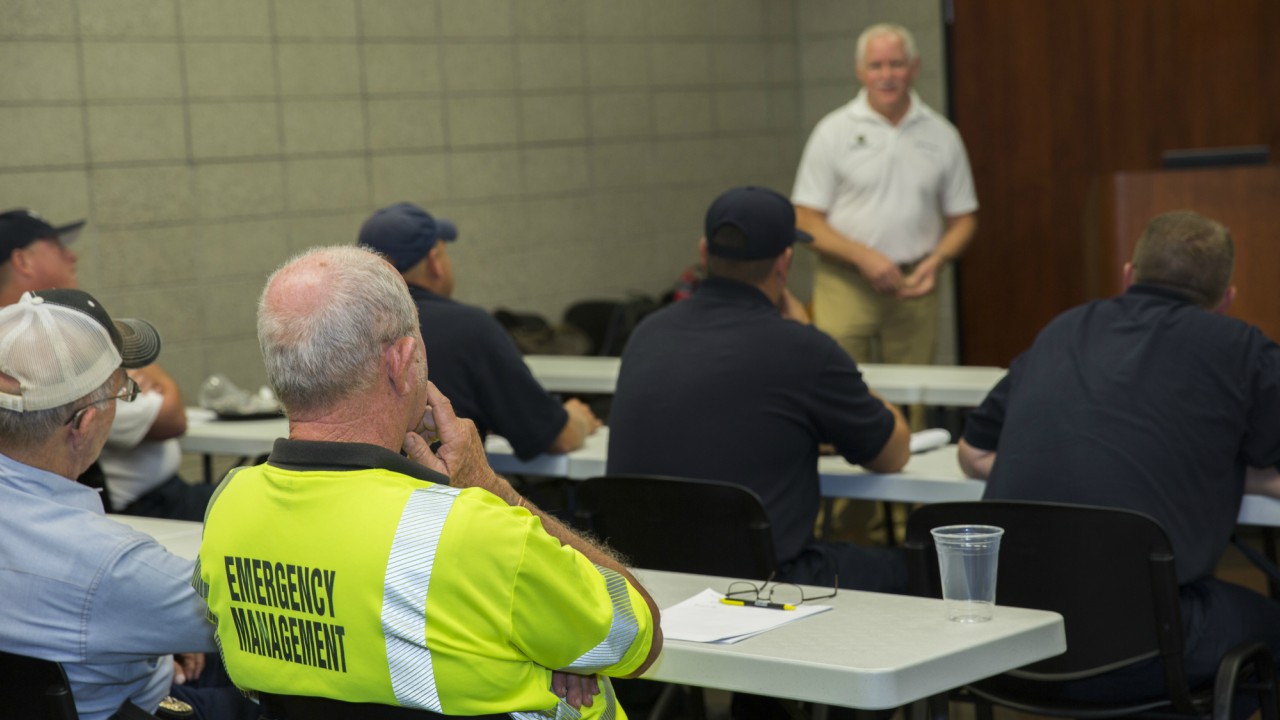Jan 01, 0001
Explore and Contribute to the Home Oxygen Therapy (HOT) Data Dashboard to help Enhance Community Safety
Help enhance practices and enhance community safety by sharing your experiences with Home Oxygen Therapy
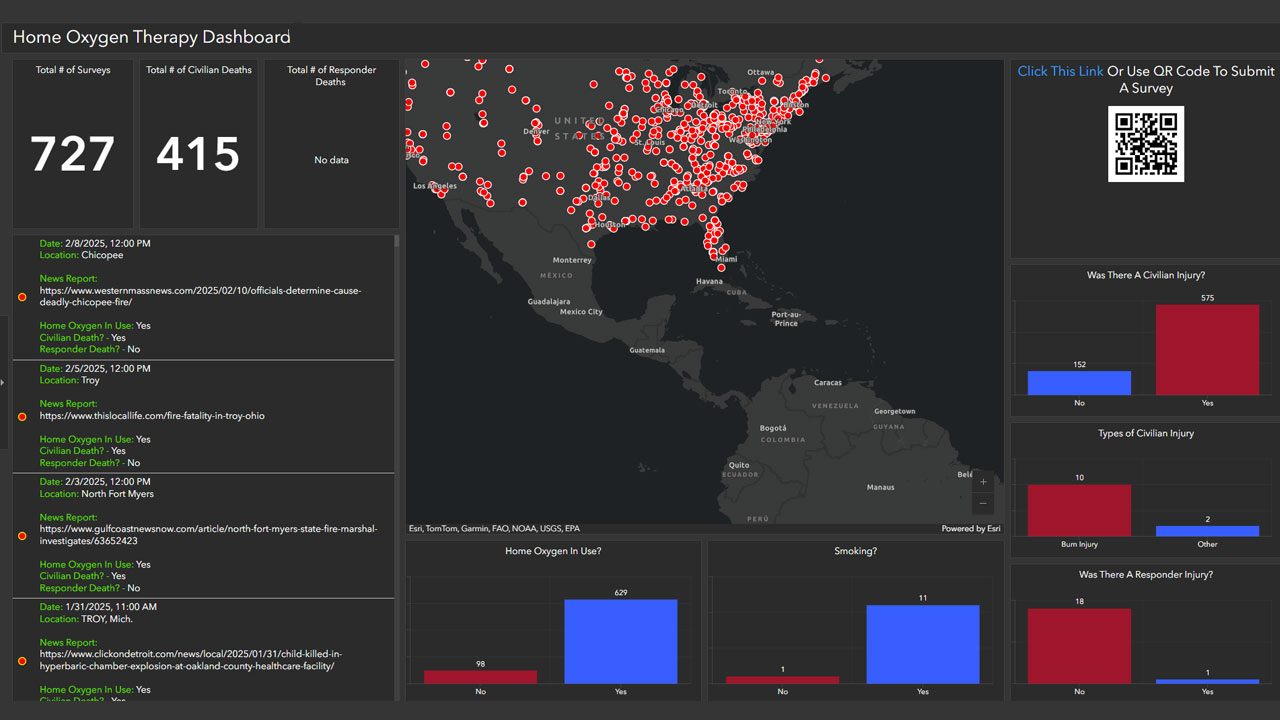
Jan 01, 0001
IAFC 2025 Conference Lineup – An Event for Every Leader
Here’s a quick look at IAFC's 2025 conference lineup
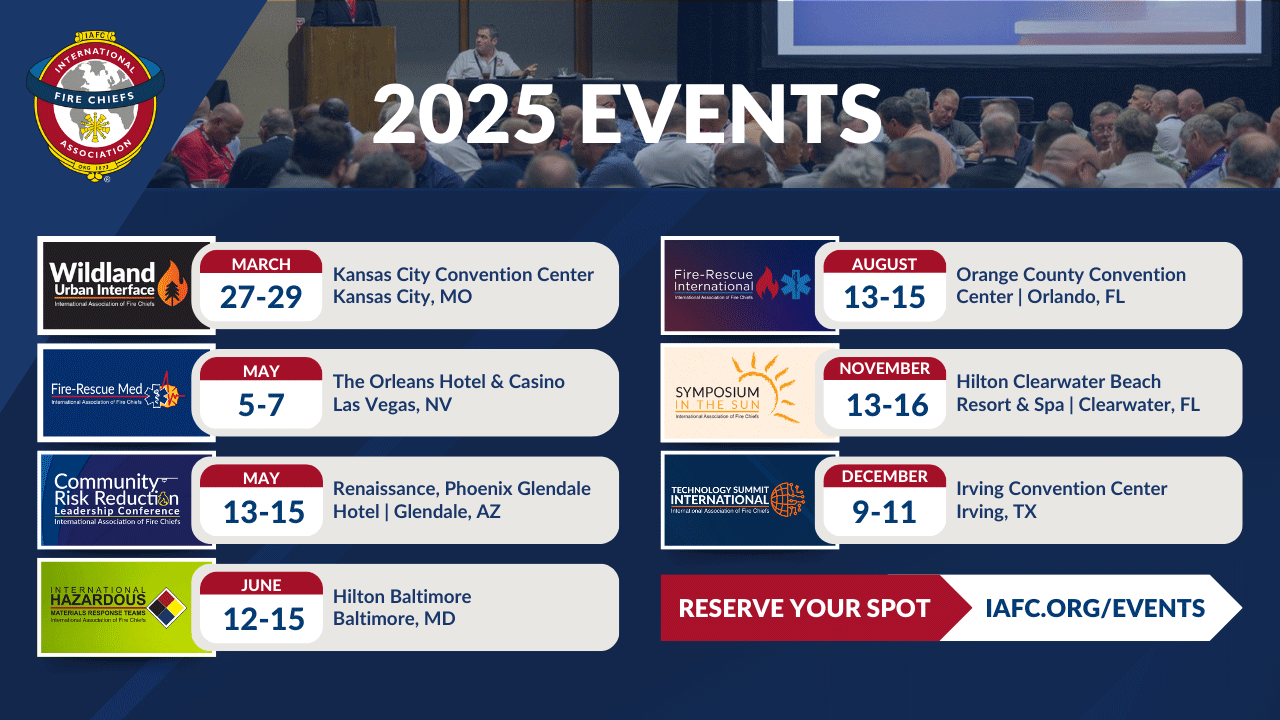
Jan 01, 0001
Register Today for IAFC Propane-Response Education Classes!
Enroll in our new Propane Emergencies Training for Responders!
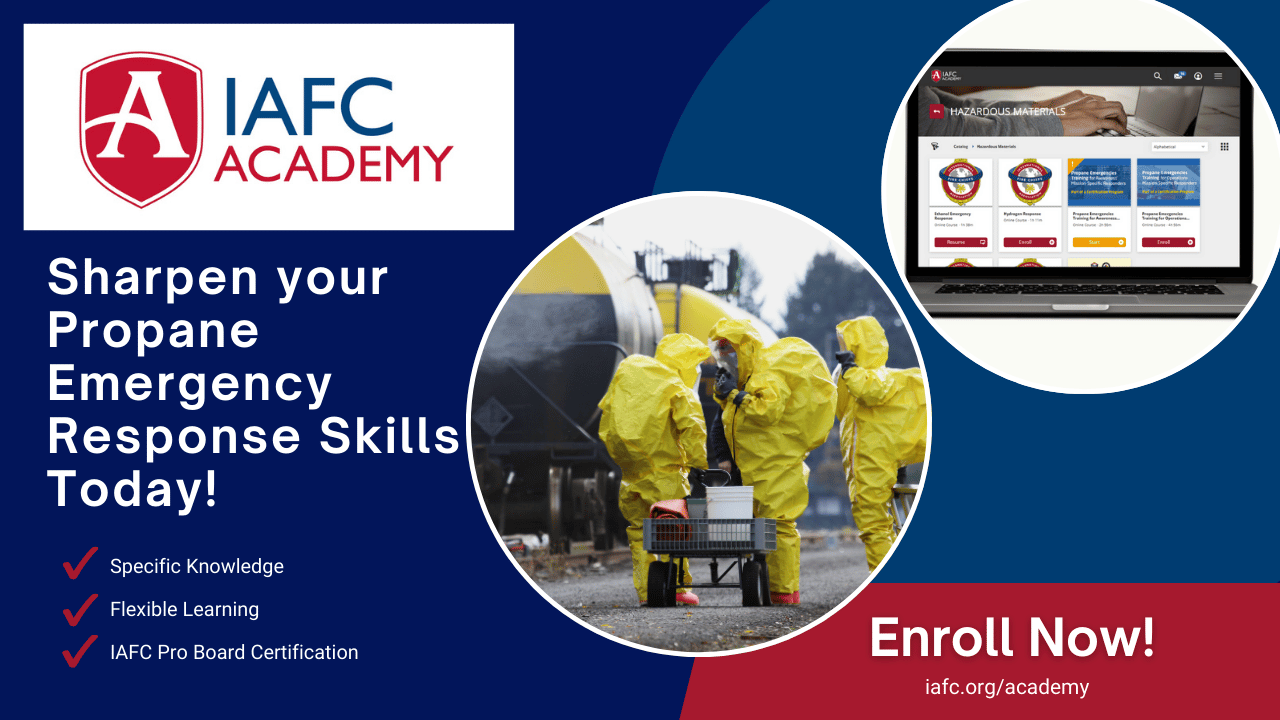
Jan 01, 0001
Crash Responder Safety Week 2024: Responders Ahead! Reduce Your Speed as You Proceed
Help raise awareness for the motoring public and implement strategies to promote a culture of safety

Jan 01, 0001
Ensuring Safety in the Age of Lithium-Ion Batteries
Resources to assist fire departments during Lithium-Ion and Energy Storage Systems response
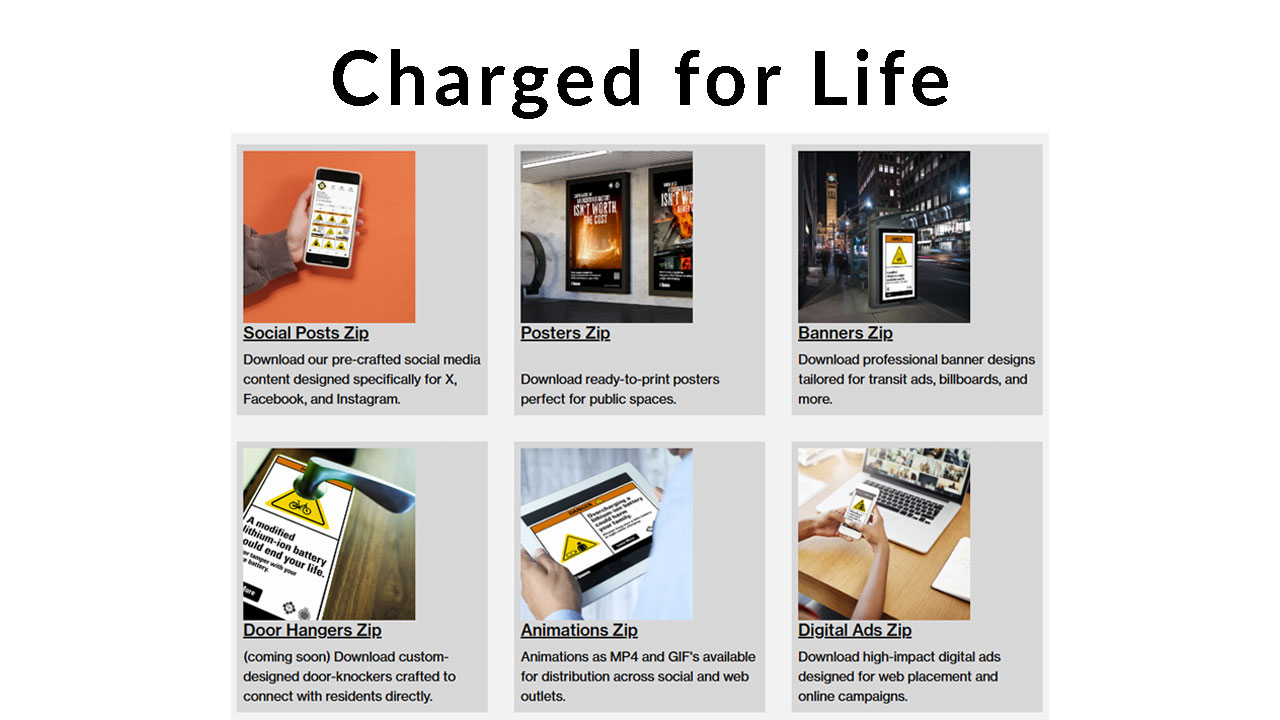
Jan 01, 0001
IAFC Terrorism and Homeland Security Committee Releases 2024-2026 Strategic Plan
IAFC members are encouraged to review the strategic plan and download the annexes for their use
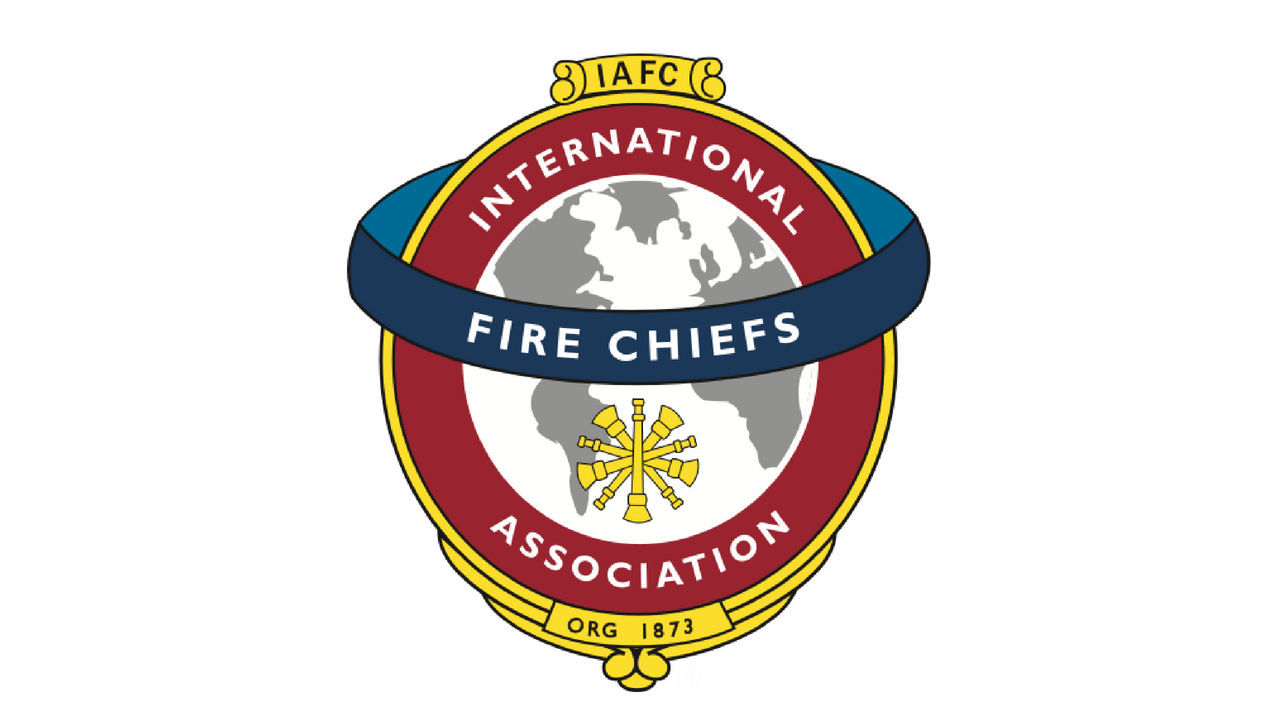
Jan 01, 0001
Come participate in the conversation about Fire Service Hazards and Building and Fire Code Prevention Measures related to Lithium-ion Batteries and Energy Storage Systems!
Join the IAFC and FLSS session on lithium-Ion Batteries during FRI.

Jan 01, 0001
Firefighter Families Visit Washington DC to Advocate for PSOB Benefits
Ask Congress to Pass the Honoring Our Fallen Heroes Act (H.R. 1719/S. 930)
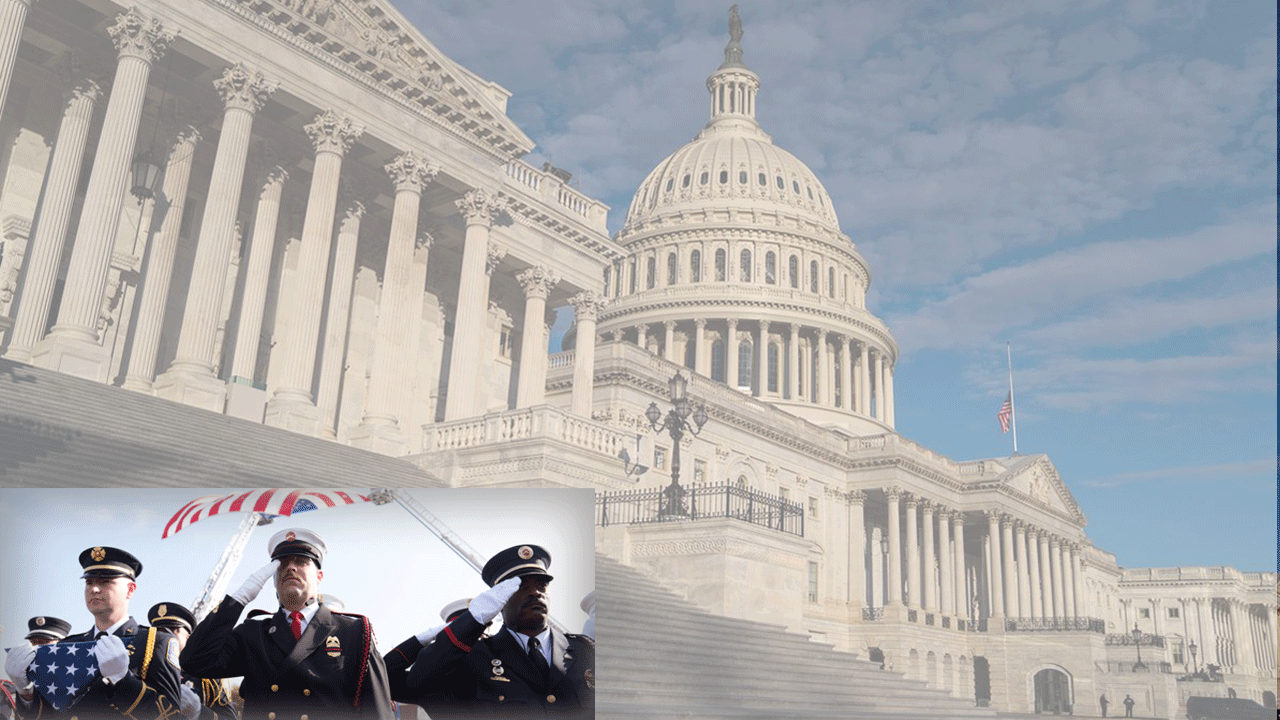
Jan 01, 0001
Pipeline and Hazardous Materials Safety Administration Adopts Final Rule to Amend Real-Time Train Consist Information Requirements
Pipeline and Hazardous Materials Safety Administration (PHMSA) issued a final rule altering the Hazardous Materials Regulations found in 49 C.F.R. §§171—180
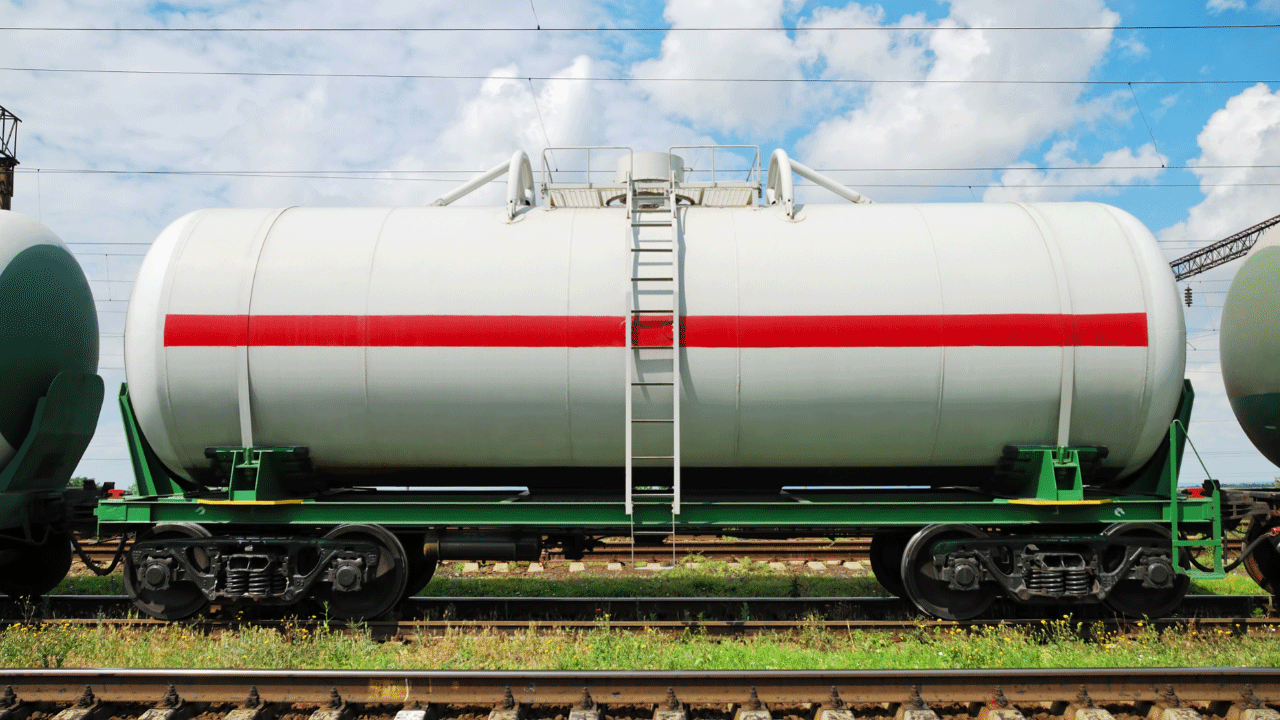
Jan 01, 0001
New Standards Development Activity on Battery Safety
NFPA is seeking comments regarding New Standards Development Activity on Battery Safety
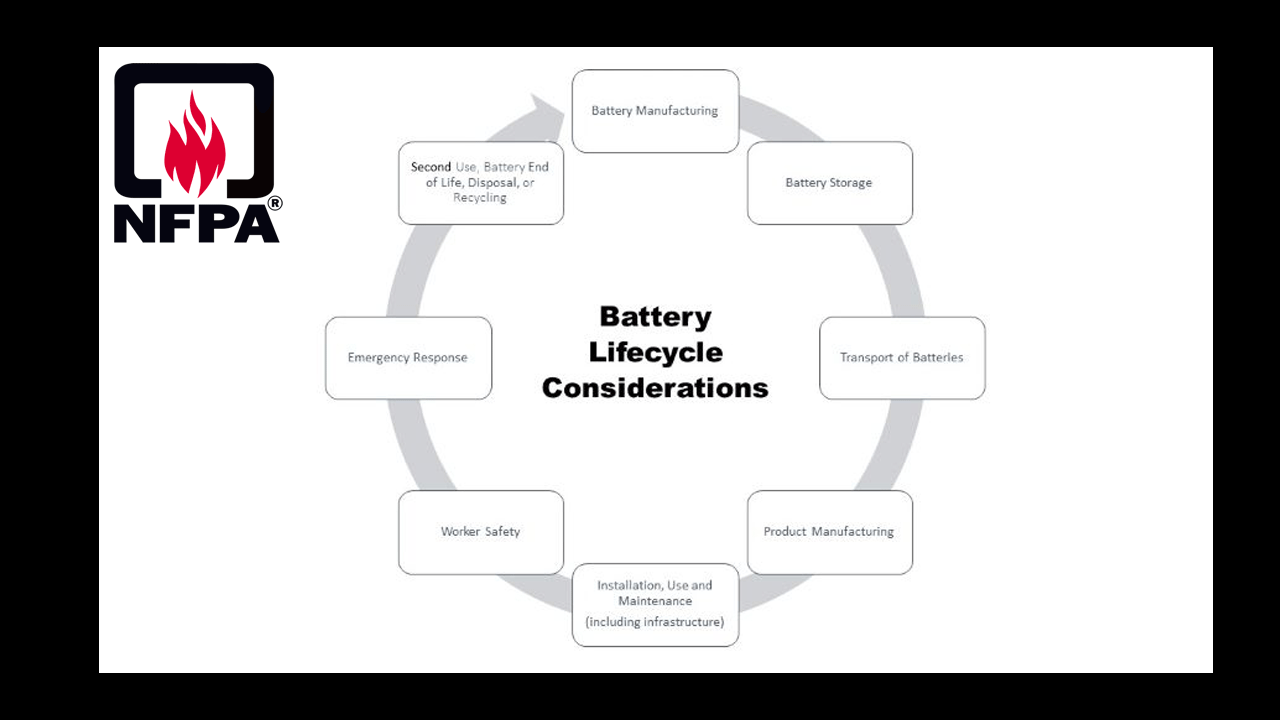
Jan 01, 0001
U.S. House of Representatives Passes Critical Fire Safety Legislation
The Setting Consumer Standards for Lithium-Ion Batteries Act has passed its first hurdle. This important safety bill and its companion legislation will now face a Senate vote.

Jan 01, 0001
Message from IAFC President John Butler re: OSHA Draft Emergency Response Standard
Message from IAFC President John Butler re: OSHA Draft Emergency Response Standard

Jan 01, 0001
Fire Chief John S. Butler Testifies on the Fire Hazards of Lithium-Ion Batteries, Calls for Immediate Action
IAFC President Testifies on the Fire Hazards of Lithium-Ion Batteries, Calls for Immediate Action
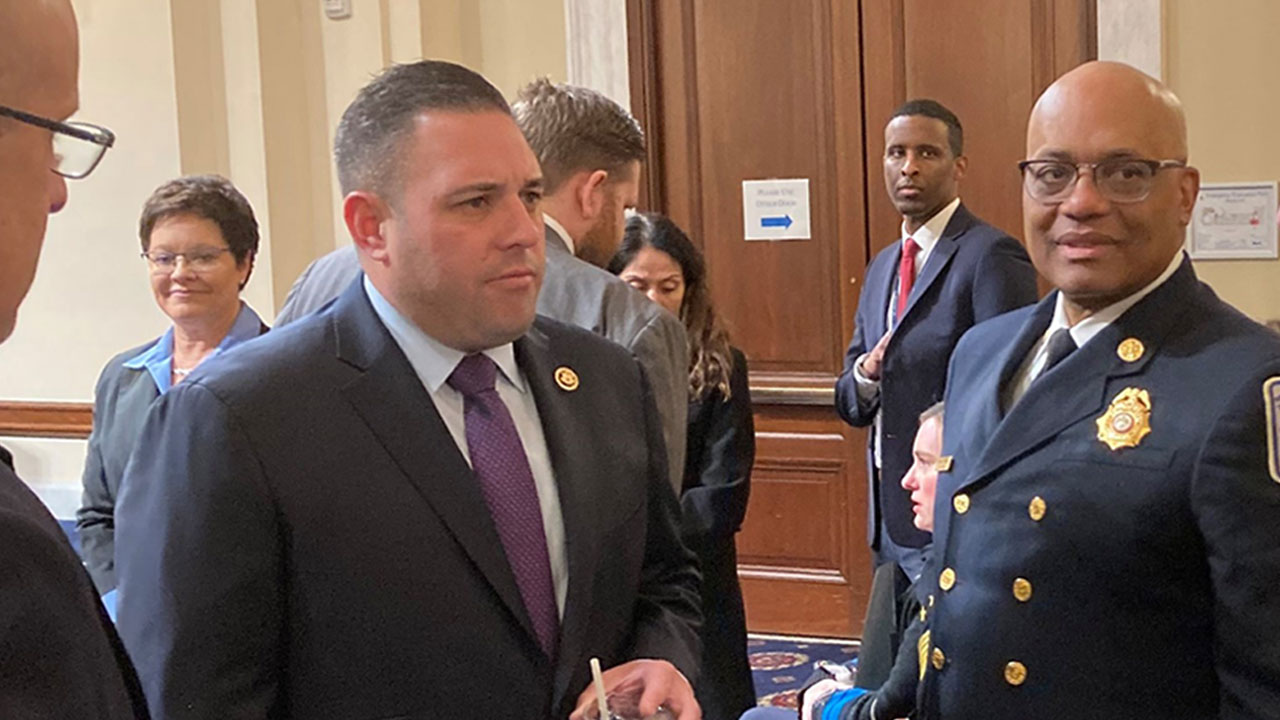
Jan 01, 0001
Important NIST Findings on Firefighter Gear: Understanding the Risks of PFAS
Are firefighters at risk of increased exposure to cancer-causing chemicals in their protective clothing?
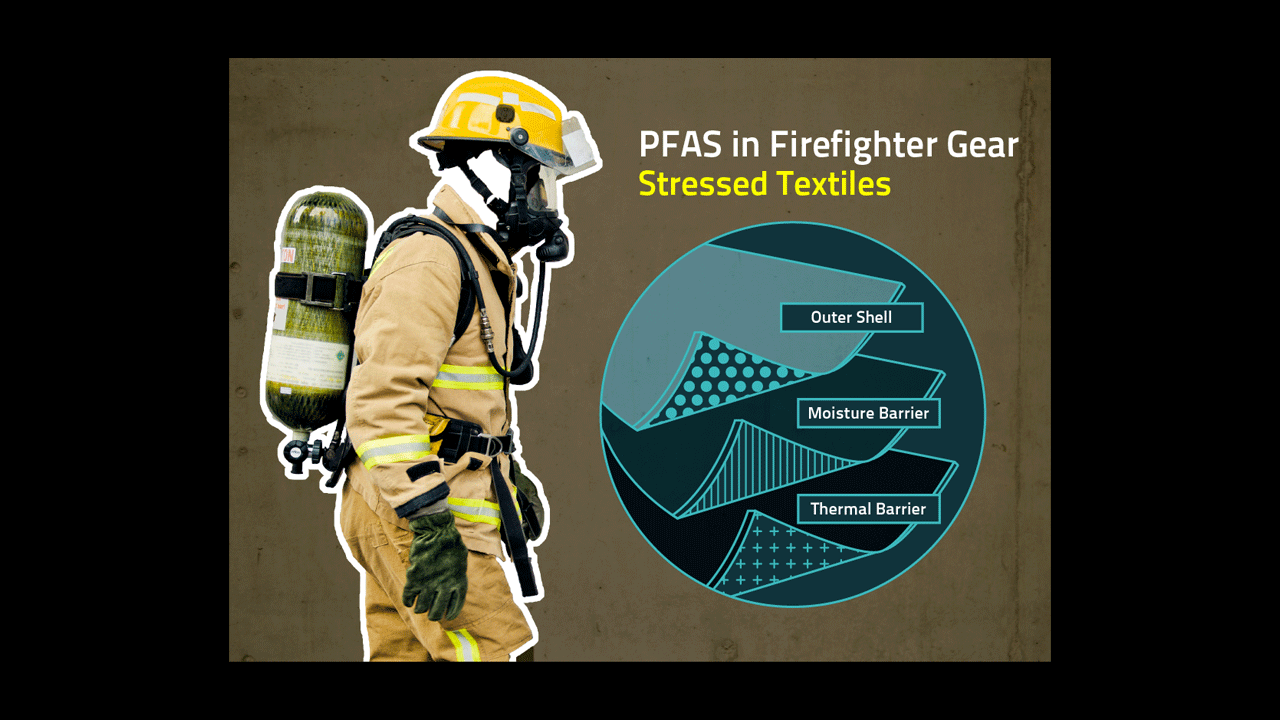
Jan 01, 0001
Department of Labor seeks to expand, establish protections for today’s emergency response workers
Proposal to update standard and expand safety & health protections for emergency responders.
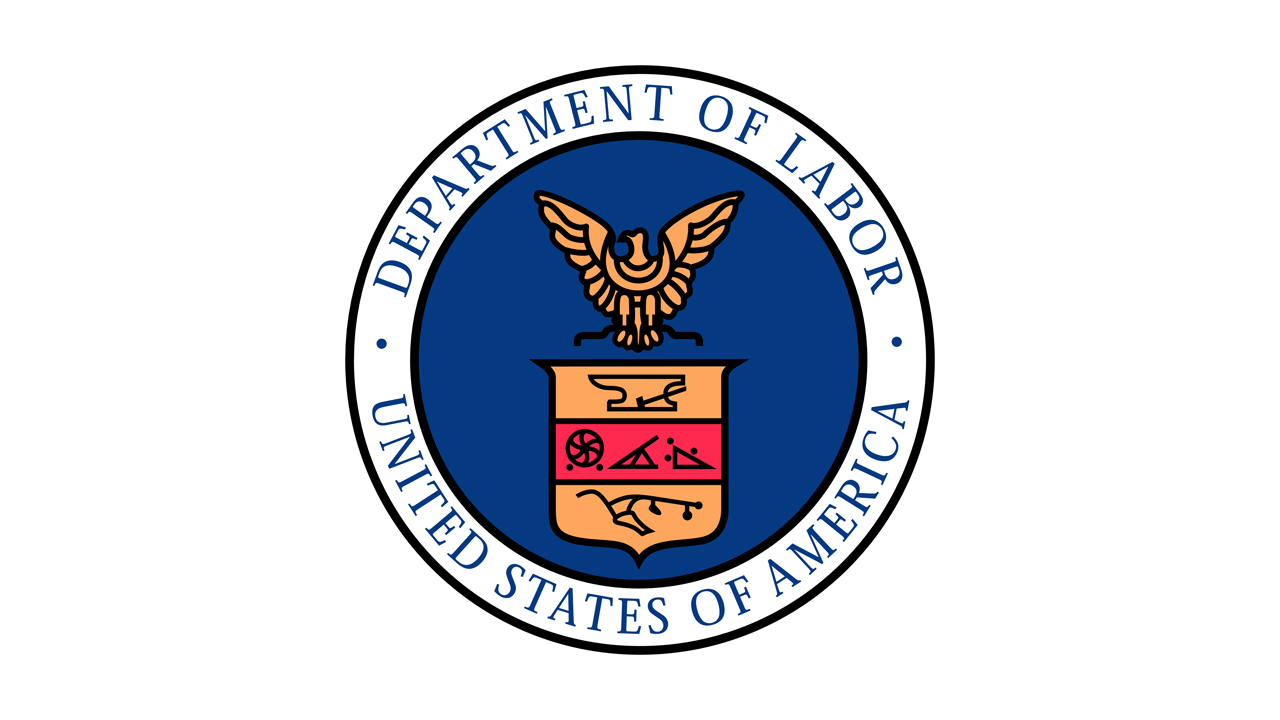
Jan 01, 0001
Training: Batteries in the Fire Service, Tall Mass-Timber Buildings & Fire Department Concerns, and Codes that Safeguard Construction
Training on operational response and code requirements for batteries in buildings and energy storage systems
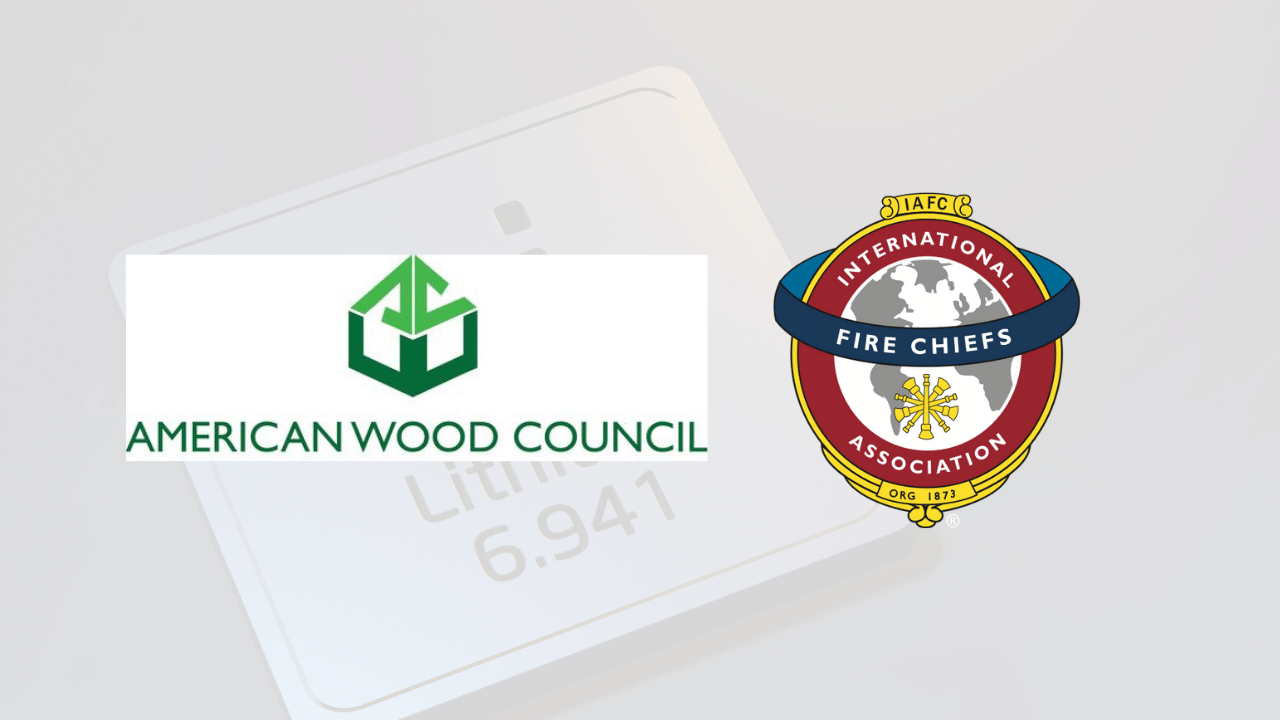
Jan 01, 0001
IAFC Presents on EV Battery Safety at the EV Charging Symposium
EV Charging Symposium brought together stakeholders to collaborate on EV battery safety
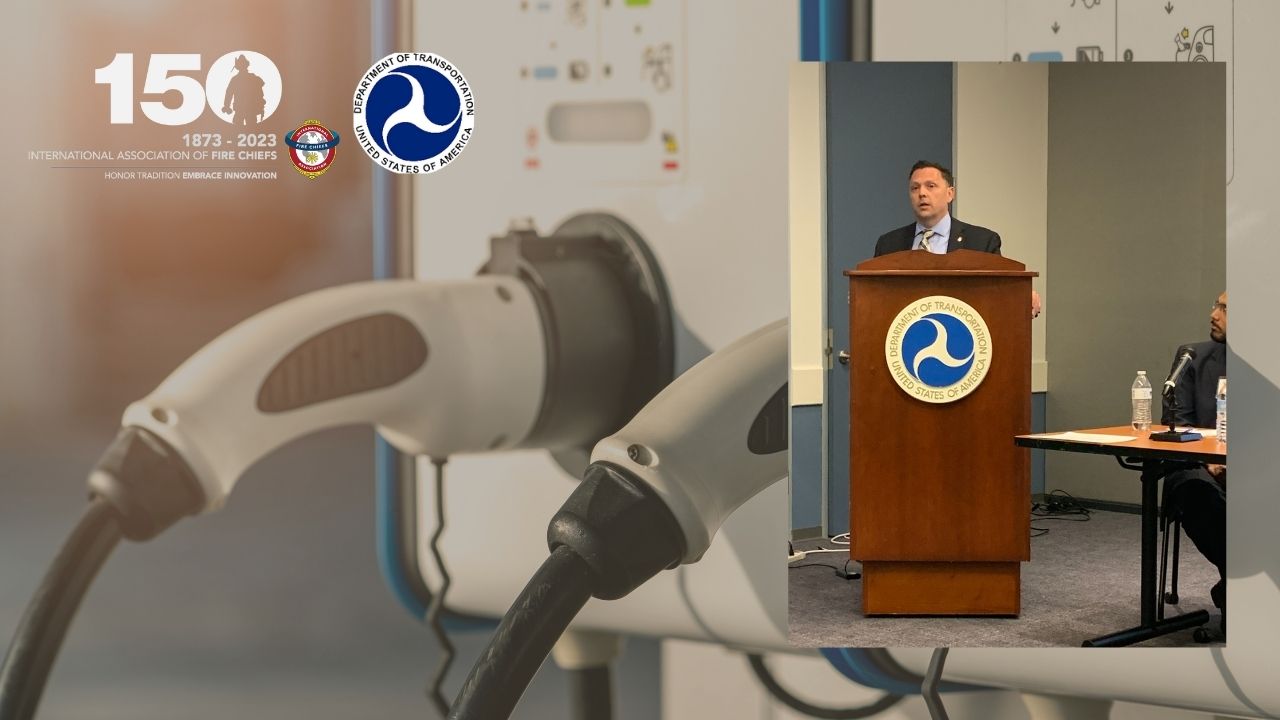
Jan 01, 0001
Spanish-Language Hazmat Instructor - Independent Contractor Opportunity
Seeking a minimum of two (2) independent contractors to serve as Spanish-speaking Hazmat Safety Instructors
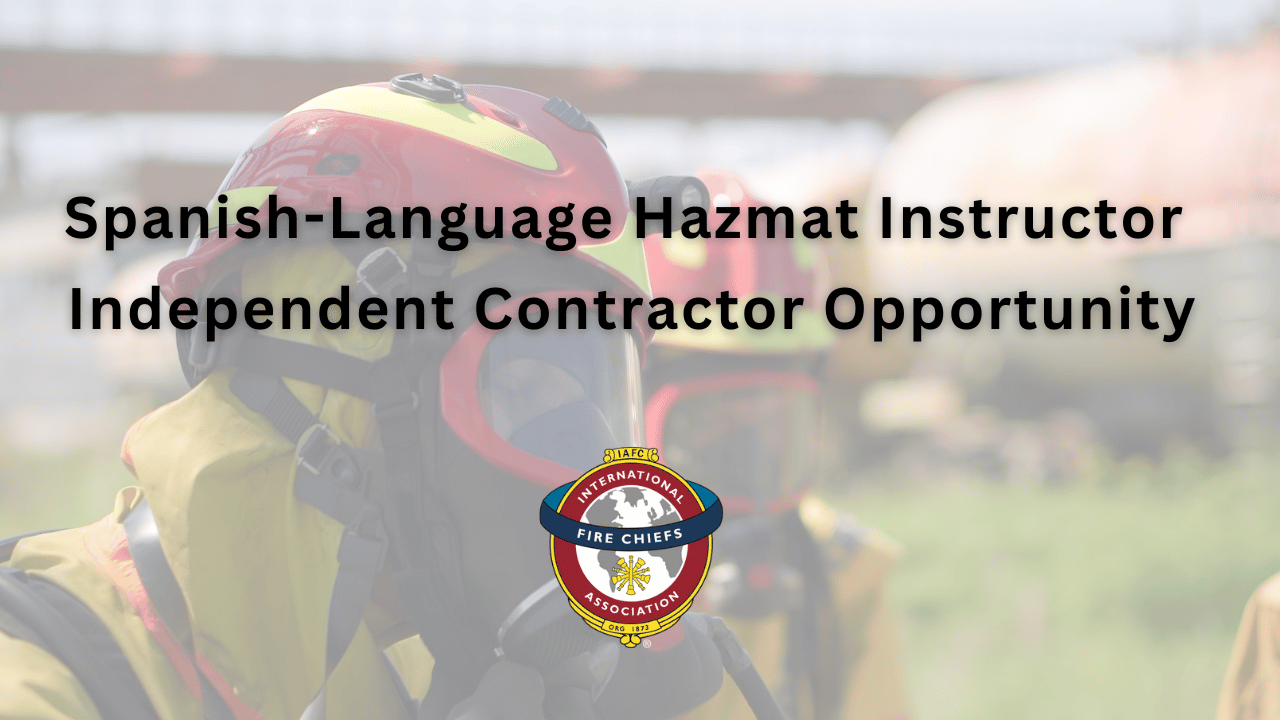
Jan 01, 0001
The 2023 Safety Stand Down Quiz is Now Live – Test Your Knowledge on Lithium-ion Battery Response
In support of this year’s Safety Stand Down, emergency services personnel are encouraged to take and promote the quiz.
![]()
Jan 01, 0001
“Lithium-ion Batteries: Are You Ready?” is Announced as Theme for Safety Stand Down, June 18-24, 2023
The 2023 Safety Stand Down will be June 18 - 24. The week of the Safety Stand Down will cover topics relating to lithium-ion battery response and safety, which will be broken down into five daily focus areas: recognition of hazards, firefighting operations, firefighter safety, post-incident considerations, and public education.
![]()
Jan 01, 0001
Propane Emergencies: Basic Certifications with Propane Emergency
It is essential that all responders to understand the changes that have occurred that pertain to NFPA 470 and be well versed in the OSHA requirements.
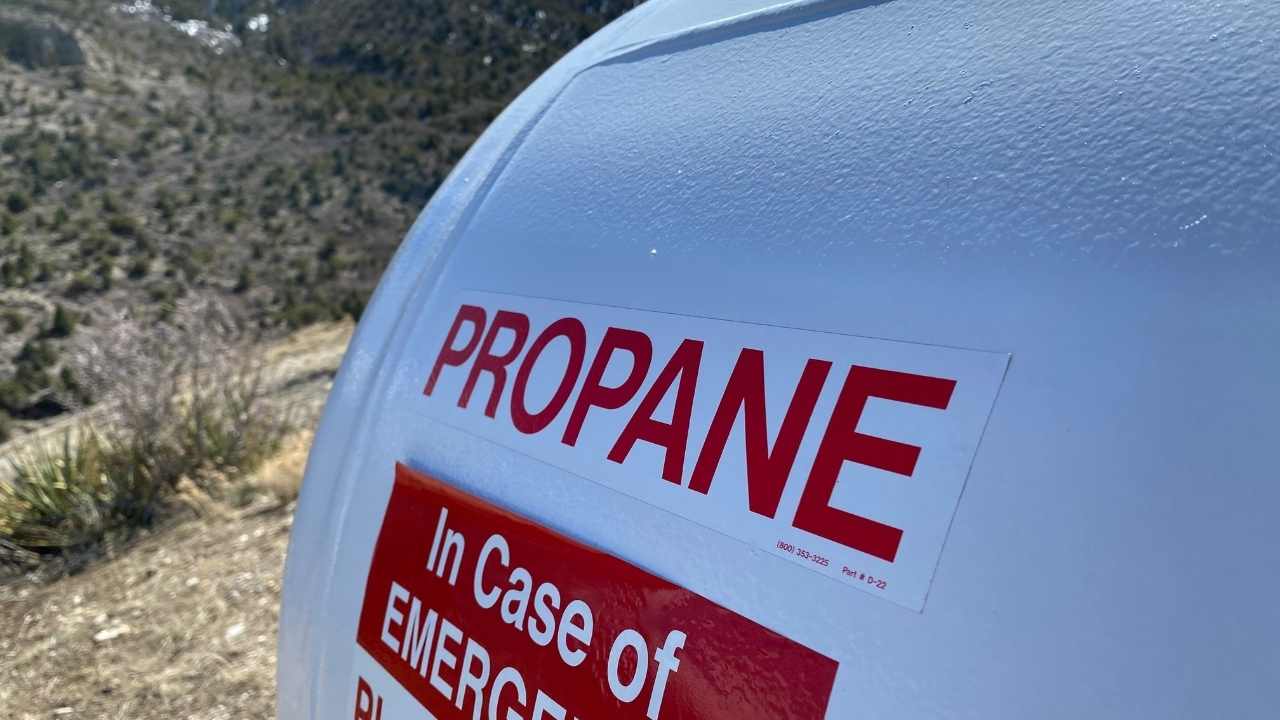
Jan 01, 0001
Hazardous Materials Emergency Response Roundtable
Reports capture the findings from these assessments and the discussion from the recent Roundtable meeting.
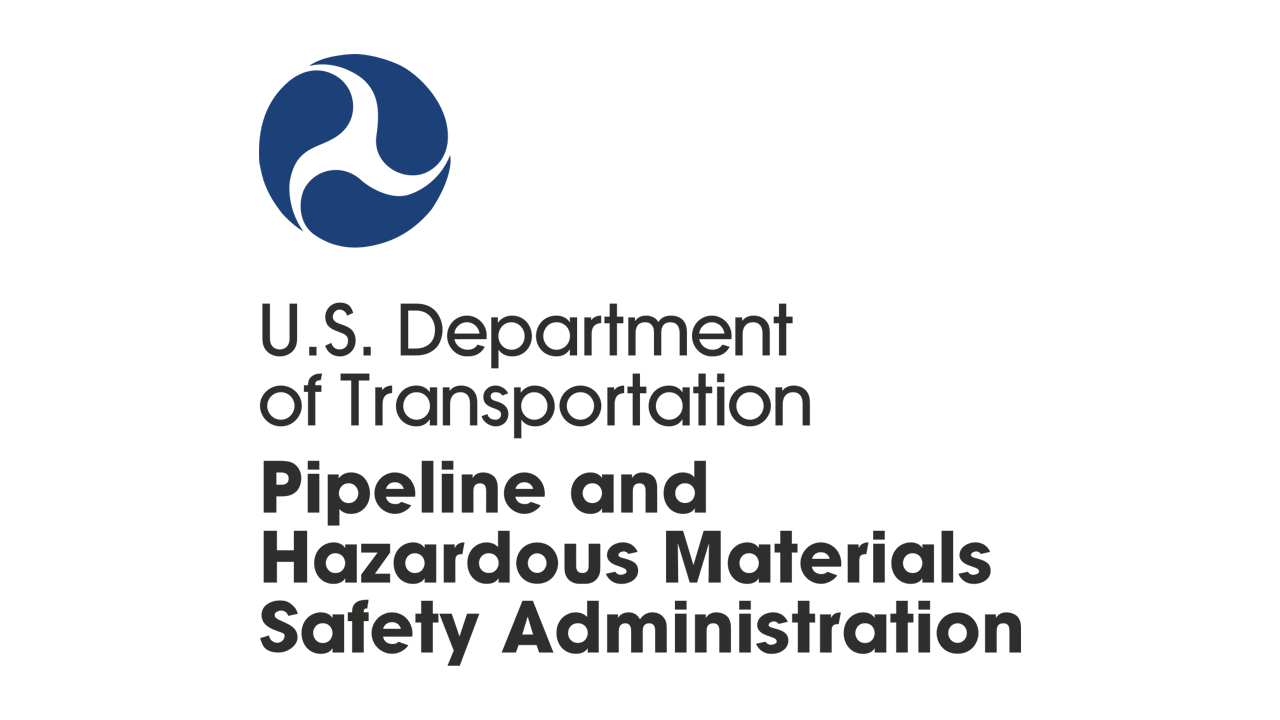
Jan 01, 0001
Responding to Propane Incidents
While performing air monitoring of the structure for flammable gas there are a few items you need to remember to operate in a safe and efficient manner.
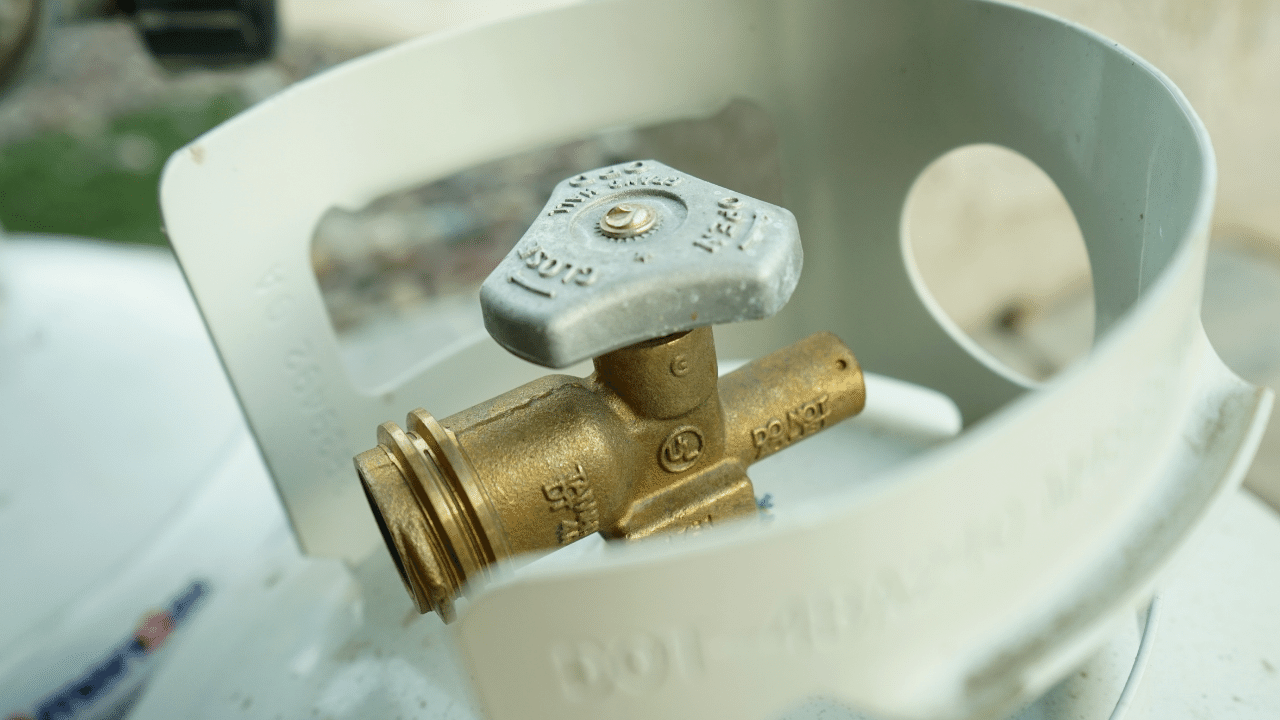
Jan 01, 0001
IAFC Launches Whole Community Planning for Disaster Online Training
This course will provide information on why/how community organizations and others can participate in inclusive emergency planning processes to improve resiliency.
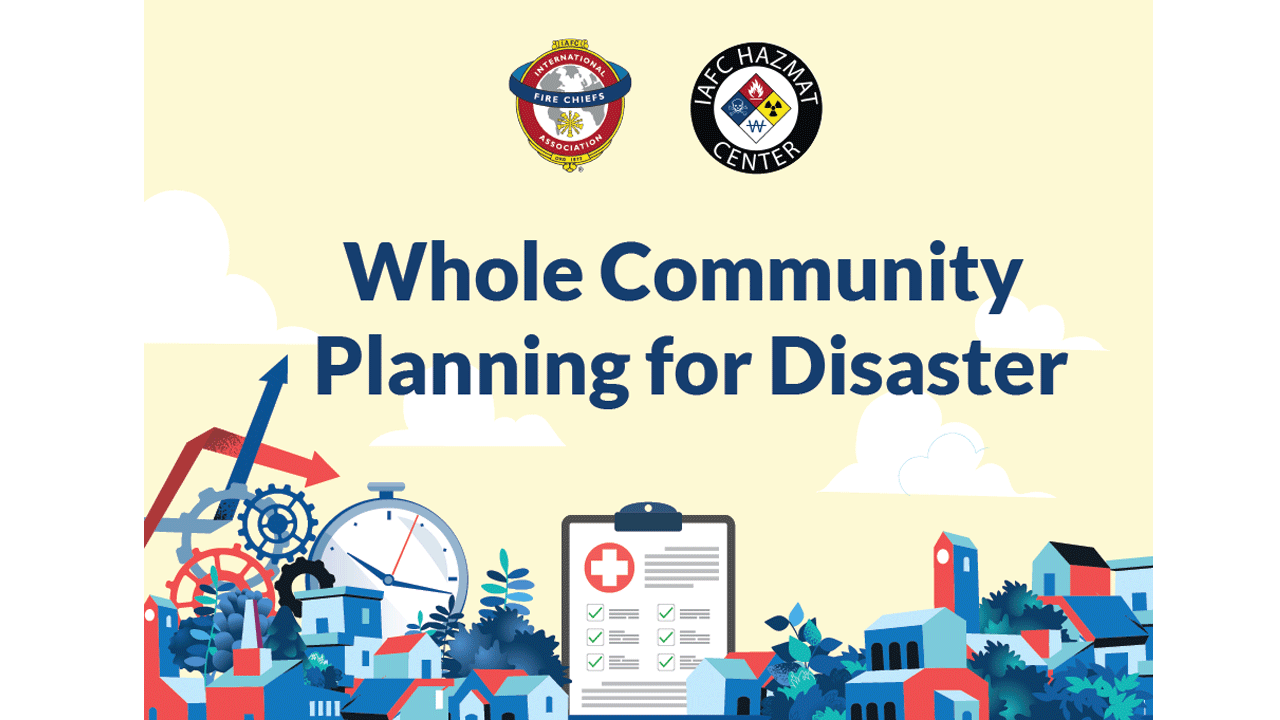
Jan 01, 0001
New Ethanol Emergency Response Training Now Available
RFA and TRANSCAER announces new ethanol emergency response training.

Jan 01, 0001
Congress Passes Legislation to Address Per- and Polyfluoroalkyl Substances (PFAS)
This year’s NDAA contains several provisions that address problems relating to Per- and Polyfluoroalkyl Substances (PFAS).
.jpg?sfvrsn=844c690c_3)
Jan 01, 0001
Save the Date: 3rd International Fire Operations Conference & Exhibition
A platform for academicians, researchers, managers, subject matter experts & students to share their research findings/best practices with the global audience.

Jan 01, 0001
Needs Assessment of US Fire Service
Fifth Needs Assessment shows some progress but continuing gaps in fire department resources.
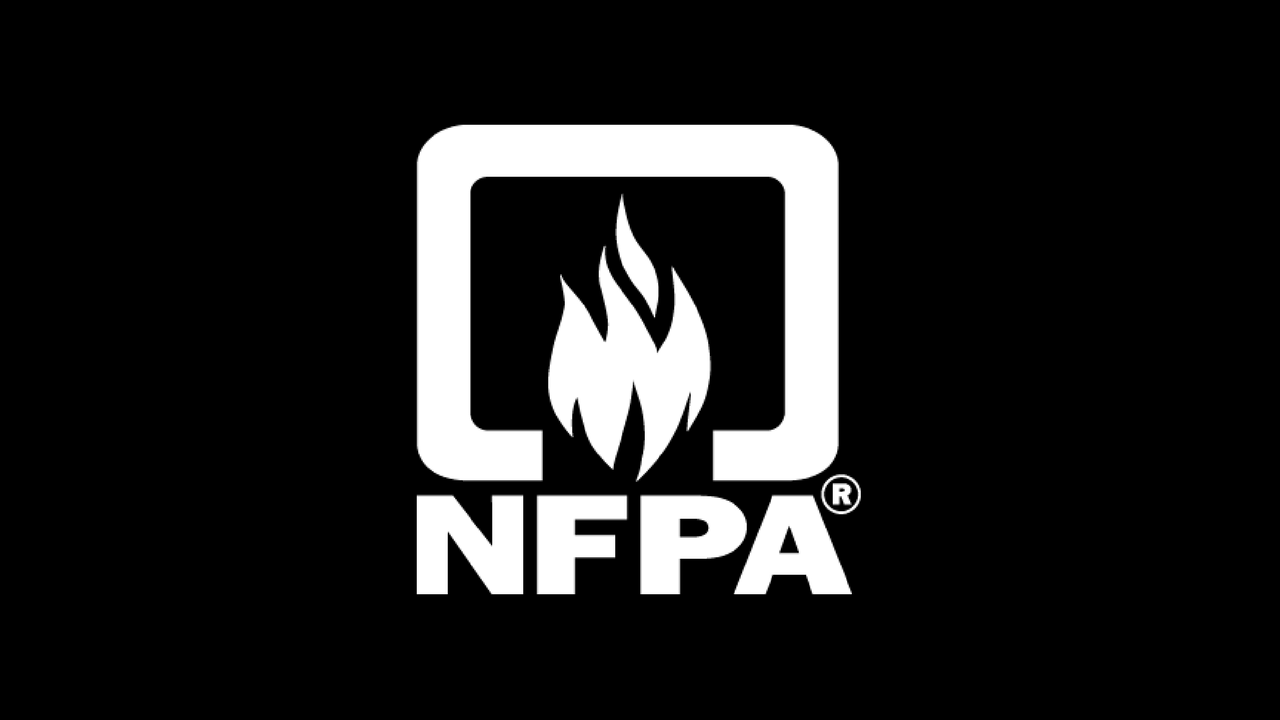
Jan 01, 0001
IAFC and TC Energy Mexico Pipeline Training
Training in 2020 was completed in the State of Veracruz and the State of Sinaloa and is presently underway in the State of Hidalgo October 28-29, 2021, and Guanajuato November 4-5, 2021.
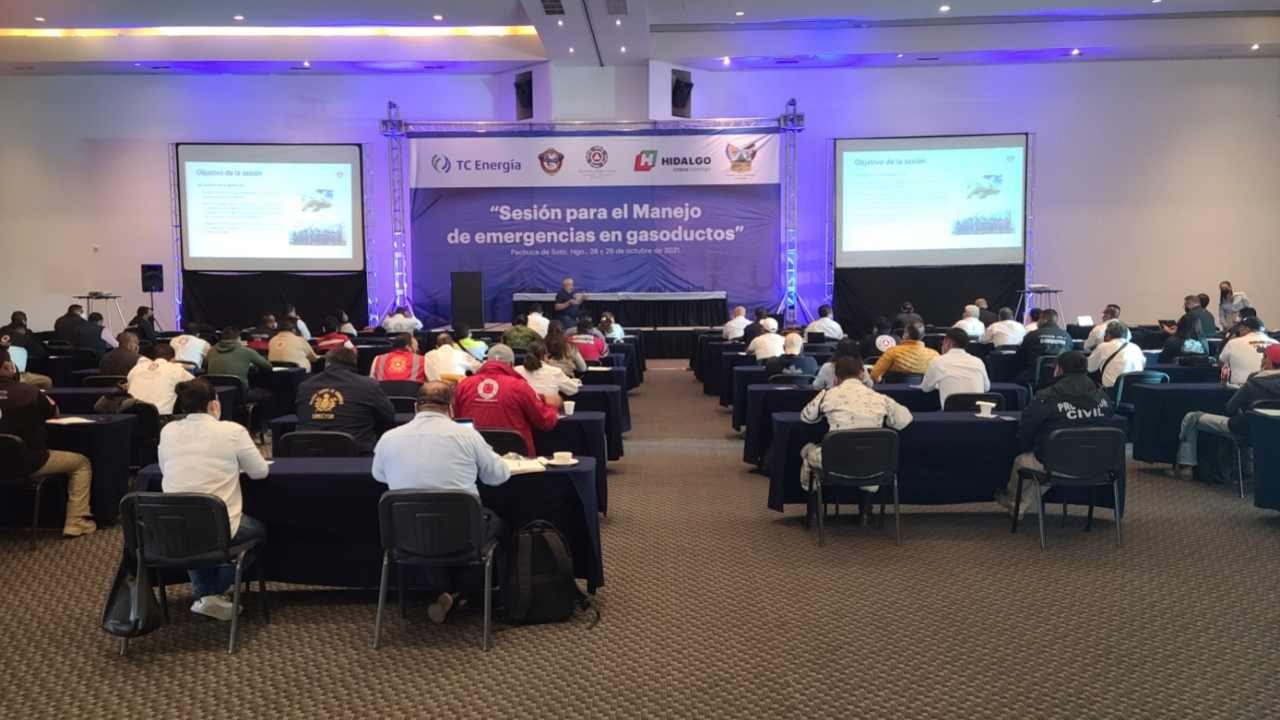
Jan 01, 0001
Fire Department Response to Electric Vehicle Fires
This one-page bulletin is intended to guide our pre-response, response and post-event responses to electrical vehicle fires.

Jan 01, 0001
White House and EPA Release Three Year Strategy for PFAS
PFAS are often dubbed “forever chemicals” because some of the chemicals linger for decades in people’s bodies and seemingly forever in the environment.
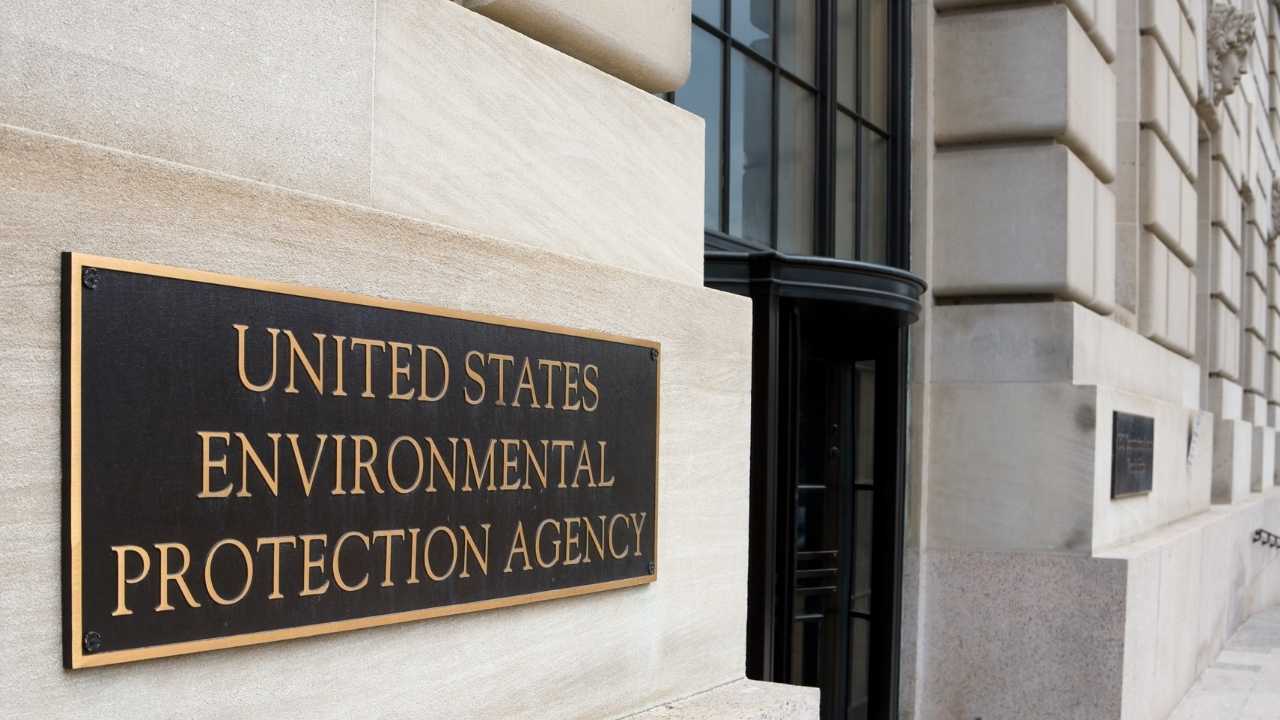
Jan 01, 0001
CSB Releases New Safety Video on Aghorn Operating Investigation Entitled "Silent Killer: Hydrogen Sulfide Release in Odessa, Texas"
The CSB also made two recommendations to federal and state regulators, OSHA and the Railroad Commission of Texas, addressing the requirements for protecting workers from hazardous air contaminants and from hazardous energy.
.jpg?sfvrsn=a908640c_3)
Jan 01, 0001
CSB U.S. Chemical Safety Board
Tracking, monitoring, investigating the causes of, and preventing accidental chemical releases remains a top priority for the CSB

Jan 01, 0001
FCC Refers Carriers to Enforcement for Failing to Meet Key 911 Location Accuracy Deadline
Vertical location is critical to helping first responders quickly locate 911 wireless callers, particularly in buildings taller than three stories.

Jan 01, 0001
Webinar: Lessons Learned from Fukushima
This presentation will share experiences and lessons that will greatly benefit decision makers and responders who have to prepare for wide area environmental remediation to respond to and recover from radiological contamination events.
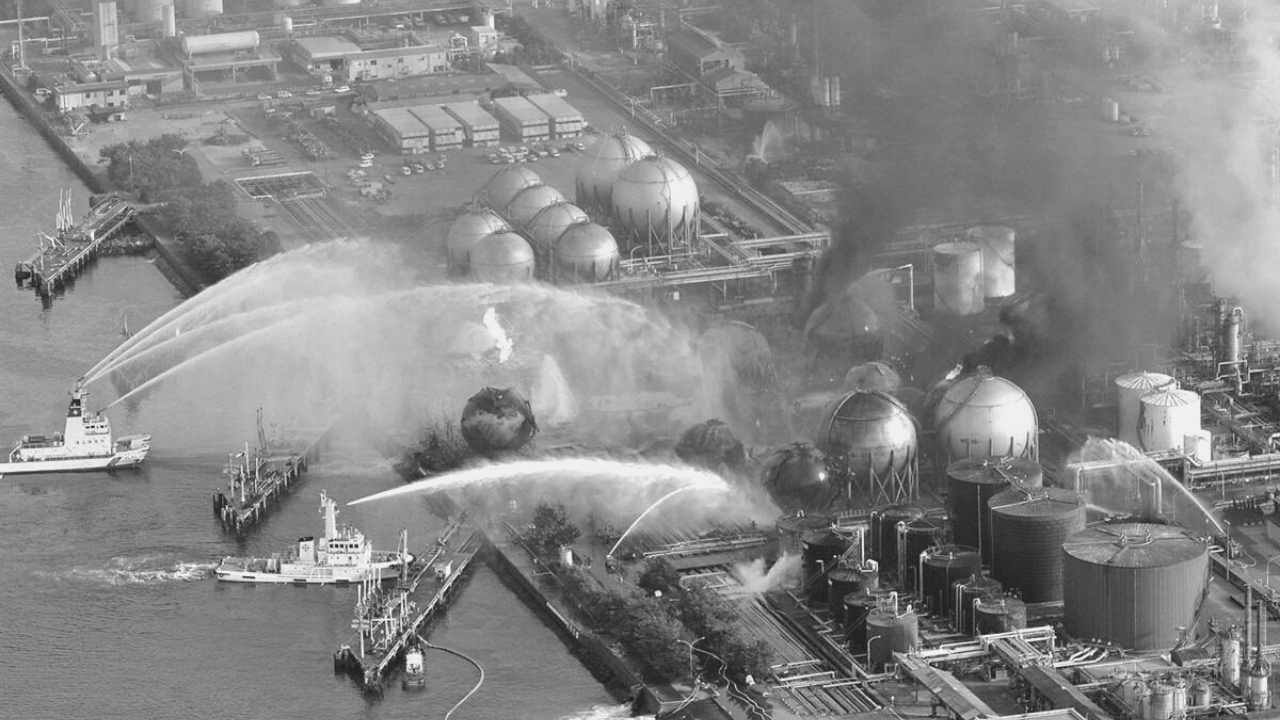
Jan 01, 0001
NHTSA Encourages First Responders to Review its Guidelines for Incidents Involving Electric of Hybrid Vehicles Following NTSB Study on Risks Posed by These Vehicles
Guidance for responders when responding to incidents including electric vehicles.
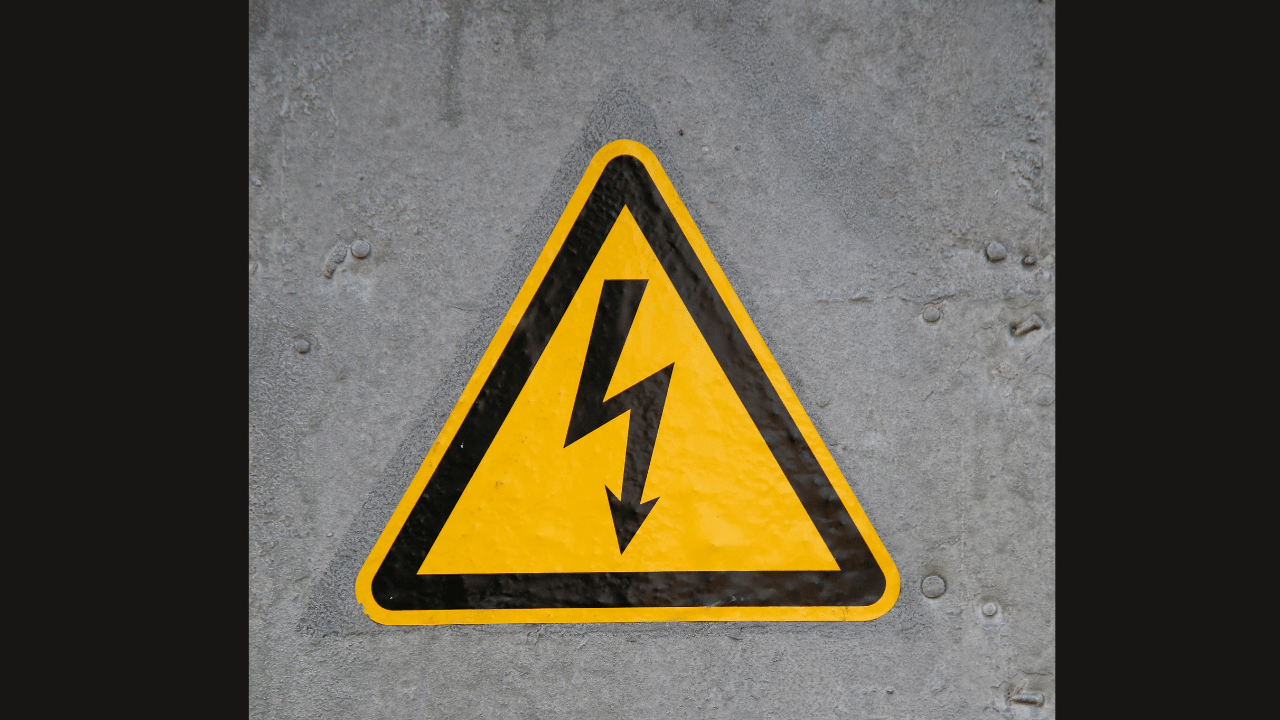
Jan 01, 0001
Congress Passes Three Year Reauthorization of PHMSA
The PIPES Act reauthorizes the PHMSA through FY 2023 and contains a number of provisions that improve pipeline safety.

Jan 01, 0001
Keep Your Community Safe
The goal of this survey is to identify the strengths of fire departments that can be helpful to other LEPCs.
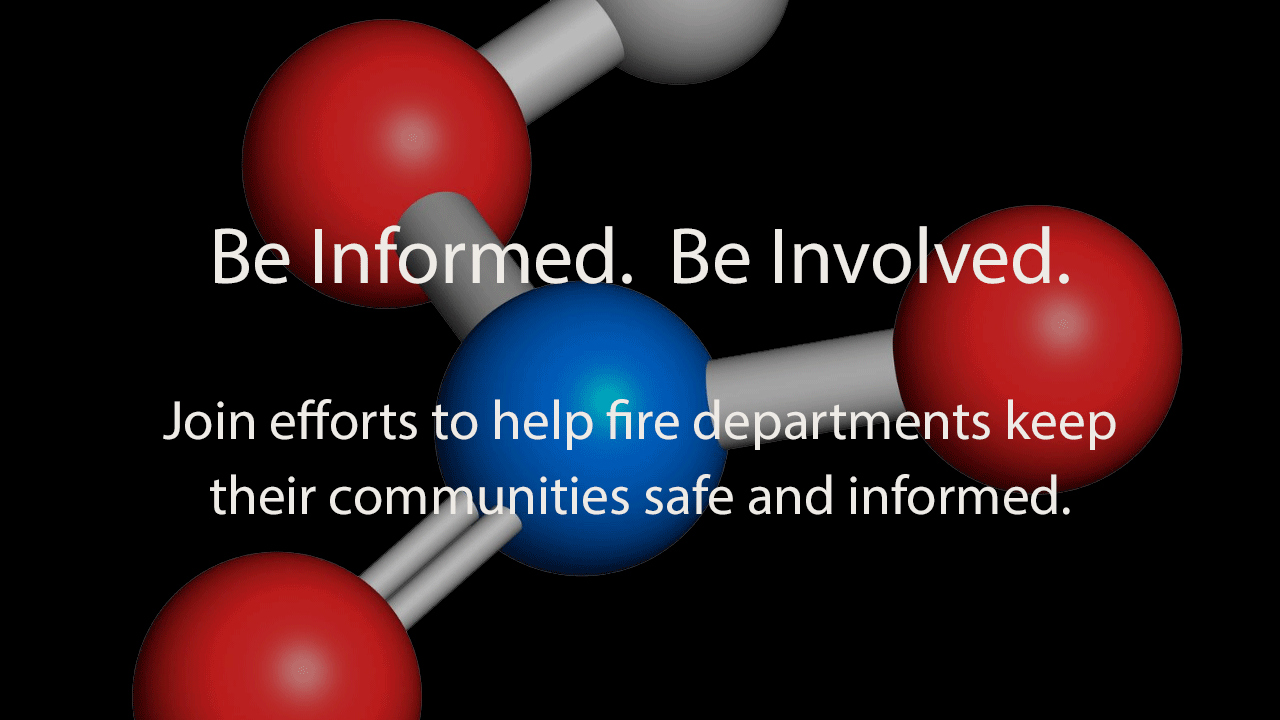
Jan 01, 0001
USDOT Announces Updated Hazmat Emergency Guidebook
The U.S. Department of Transportation’s Pipeline and Hazardous Materials Safety Administration (PHMSA) announced the publication of the 2020 edition of its Emergency Response Guidebook (ERG).
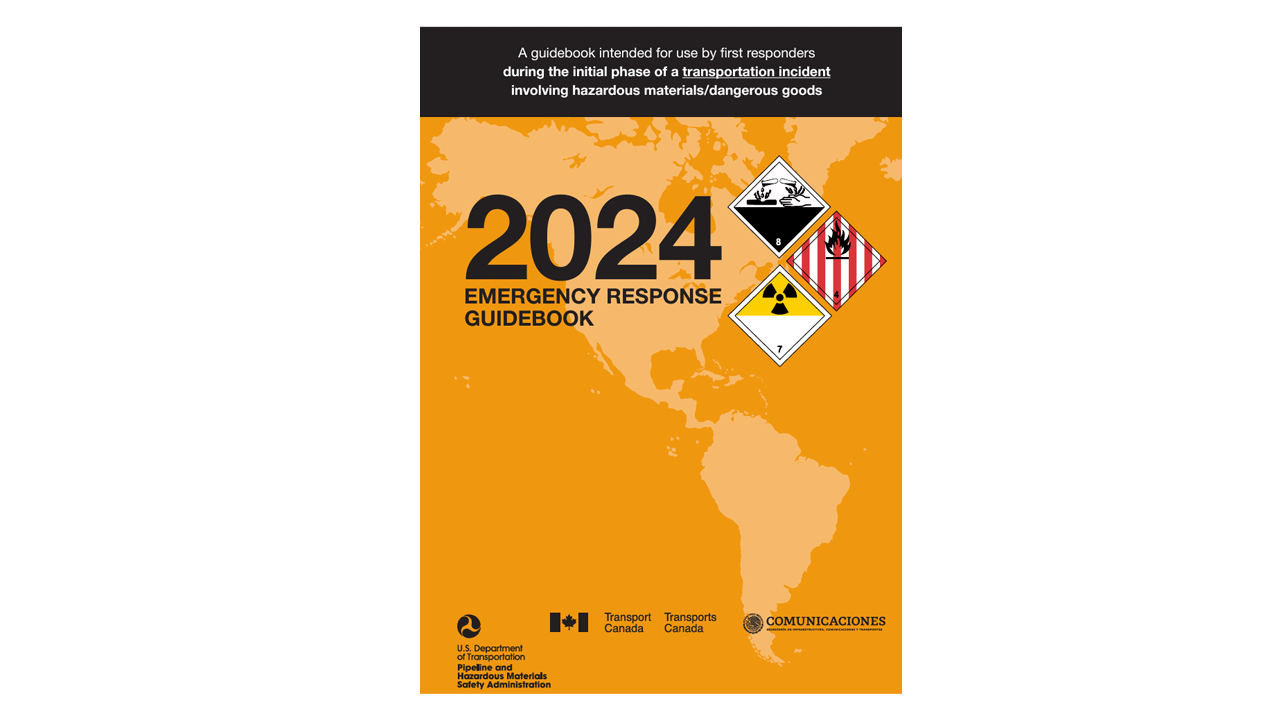
Jan 01, 0001
PFAS incineration in New York spurs legislation, loss of federal contracts
PFAS incineration has been a source of interest for some companies, with U.S. Department of Defense (DOD) contracts offering an access point.
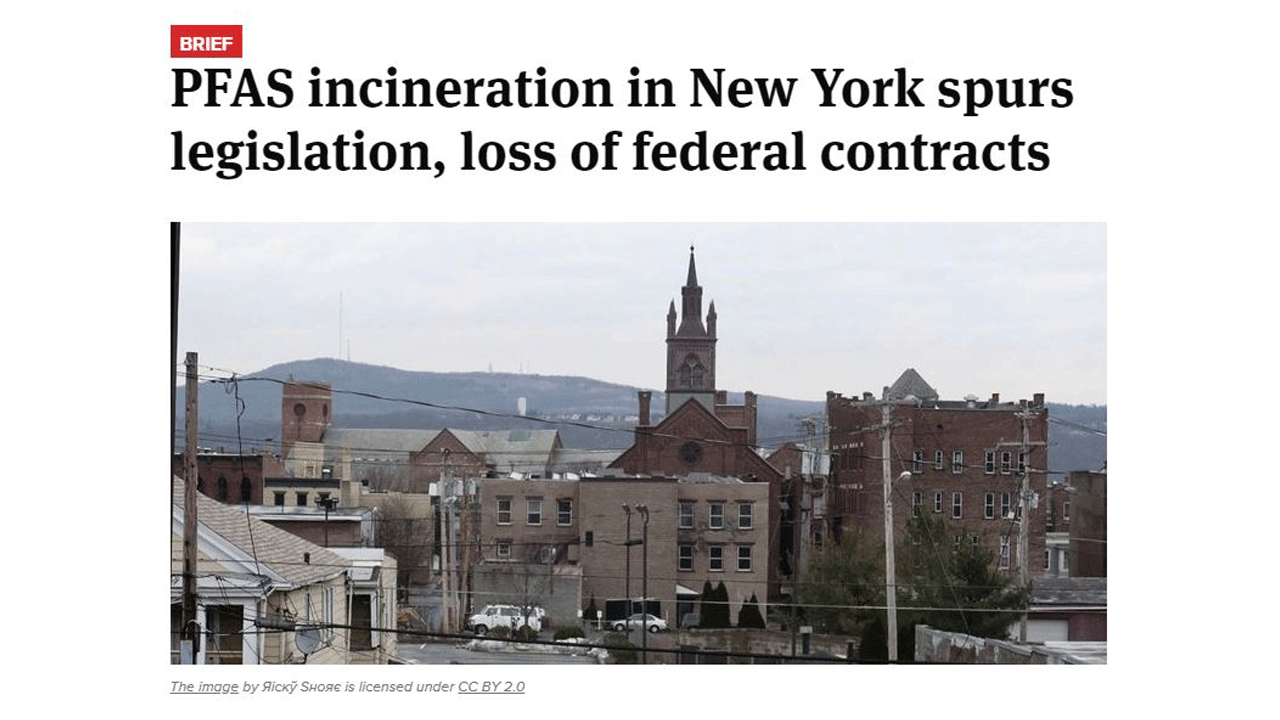
Jan 01, 0001
National Emergency Declaration: What Fire Chiefs Need to Know
President Trump on March 13 declared a national emergency over the coronavirus pandemic, invoking the Stafford Act.

Jan 01, 0001
IAFC Launches Coronavirus Task Force
The Task Force will be monitoring COVID-19 and developing recommendations for ways that fire departments can protect their members while continuing to serve their communities.

Jan 01, 0001
LEPC 101: Las Vegas Prepares for Earthquake Response
The members of the North Las Vegas Fire industrial and first responder communities participated in an earthquake tabletop exercise.
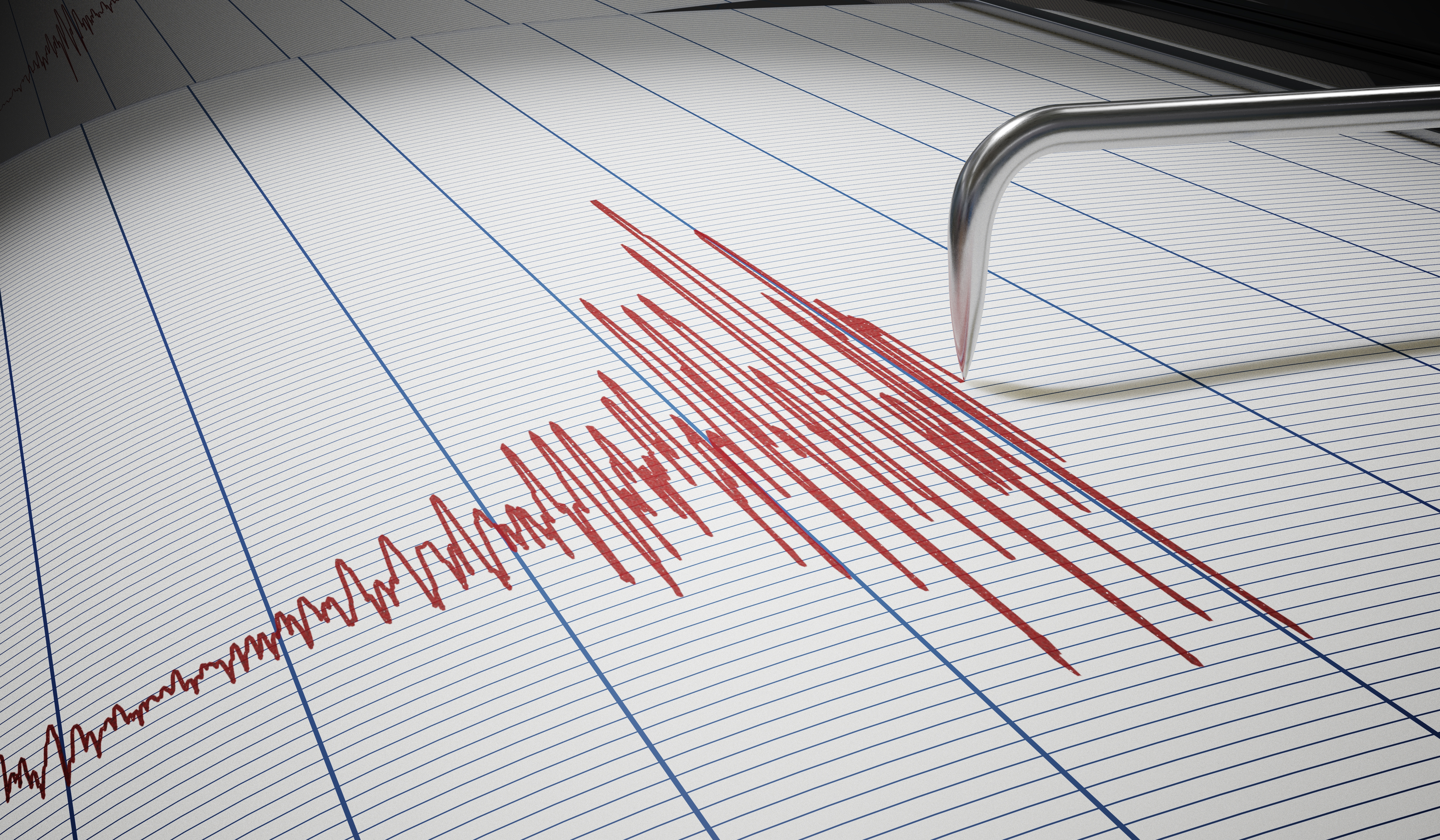
Jan 01, 0001
LEPC 101: What is an LEPC and Why is it Important
This program is designed to create community training in preparing for over the road, rail and pipeline Hazardous Materials and other emergency incidents, especially in rural areas.
.png?sfvrsn=c50970d_1)
Jan 01, 0001
Congress Passes PFAS Legislation
There is a concern that firefighters’ exposure to PFAS may lead to cancer and problems with the thyroid and immune systems.
-(1).png?sfvrsn=8038950d_1)
Jan 01, 0001
U.S. DOT Proposes Major Rule for the Safe Transportation of LNG by Rail Tank Car
Currently, LNG may only be transported via rail in a portable tank with an approval from FRA. However, the HMR does authorize the DOT 113 specification tank car for other flammable cryogenic liquids
.png?sfvrsn=24eb9a0d_1)
Jan 01, 0001
Phase Two of the IAFC Community Safety Grant Launched
Defining the LEPC. Do you understand the functions of the local emergency planning committee?

Jan 01, 0001
Chief Rader: Change Begins With Leaders
Chief Jan Rader walks through ground zero of the opioid epidemic in her state by exploring how the community and first responders are making a difference - especially through community partnerships.

Jan 01, 0001
T-Band Voter Voice Campaign Launched
The IAFC has launched a Voter Voice campaign to support preserving public safety’s access to the T-Band.
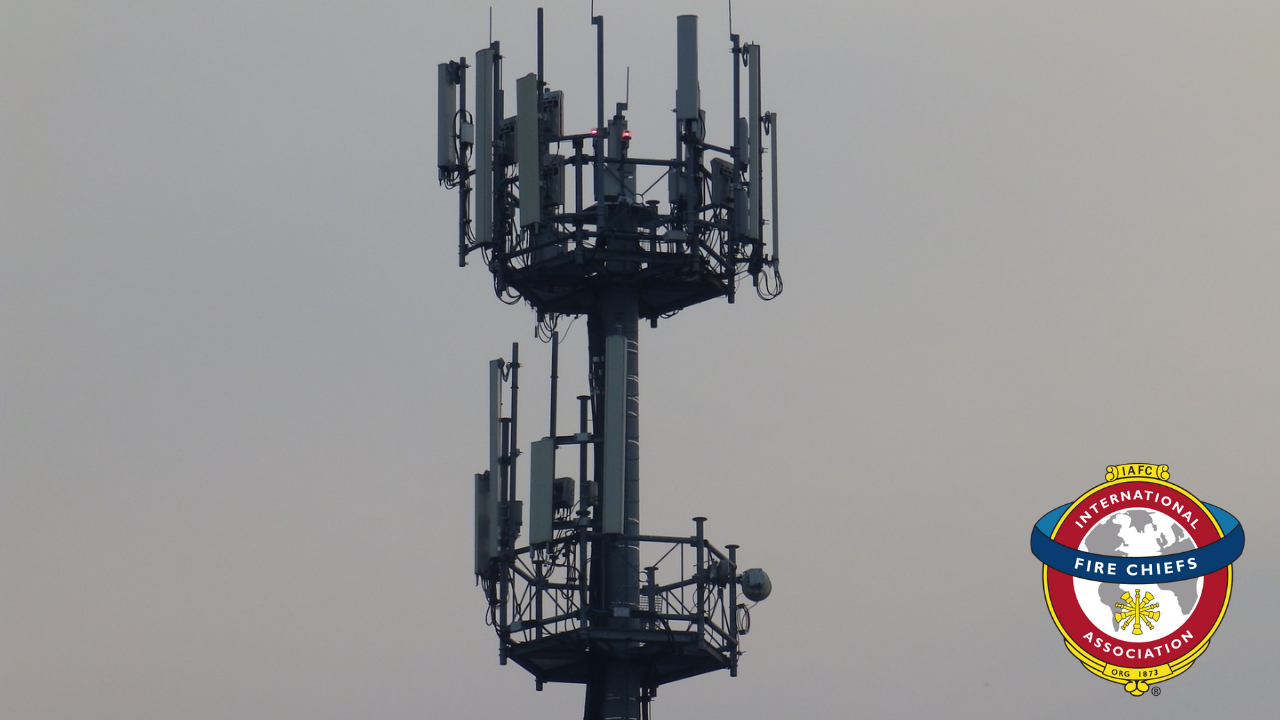
Jan 01, 0001
Final Rule from PHMSA and FRA seeks to make preparedness and mitigation easier
New rule regarding High Hazard Flammable Trains (HHFTs) went into effect earlier this year (April 1).
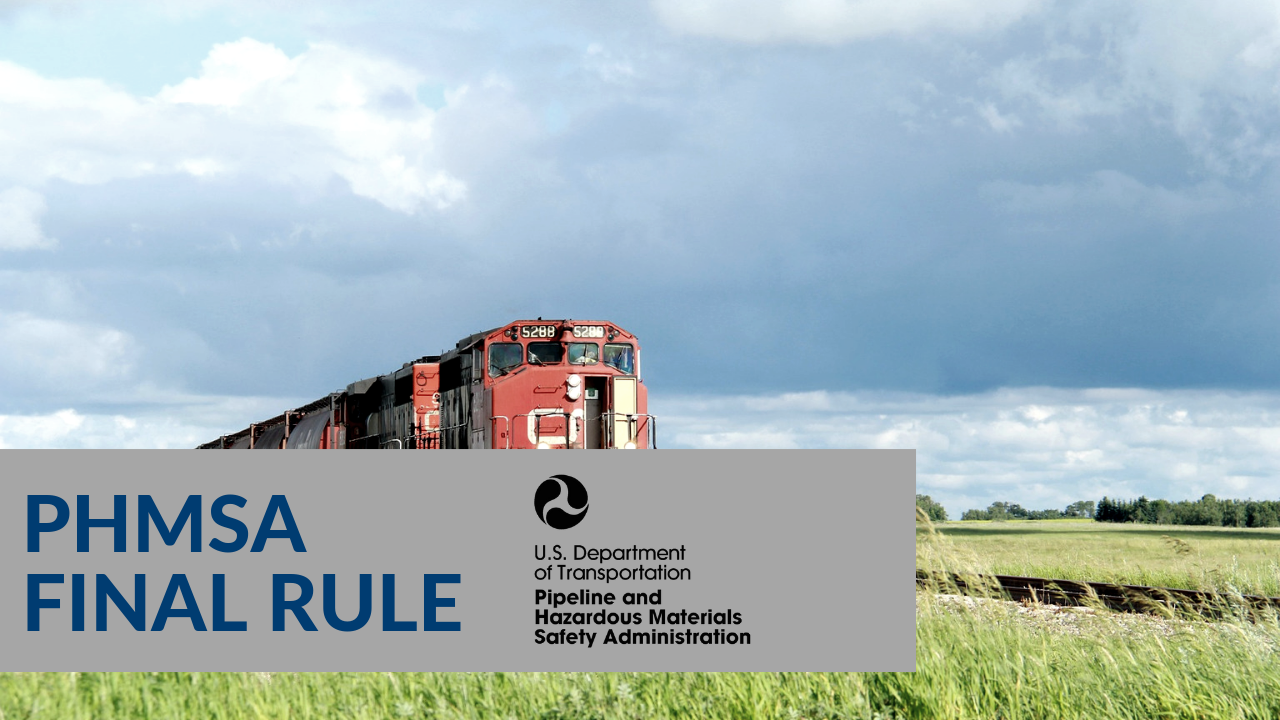
Jan 01, 0001
IAFC Hazmat Center Brings in Experts from Across the US to Help Develop Community Safety Tool-Kit
First responders and safety experts meet in Baltimore to discuss issues facing LEPCs across the nation.
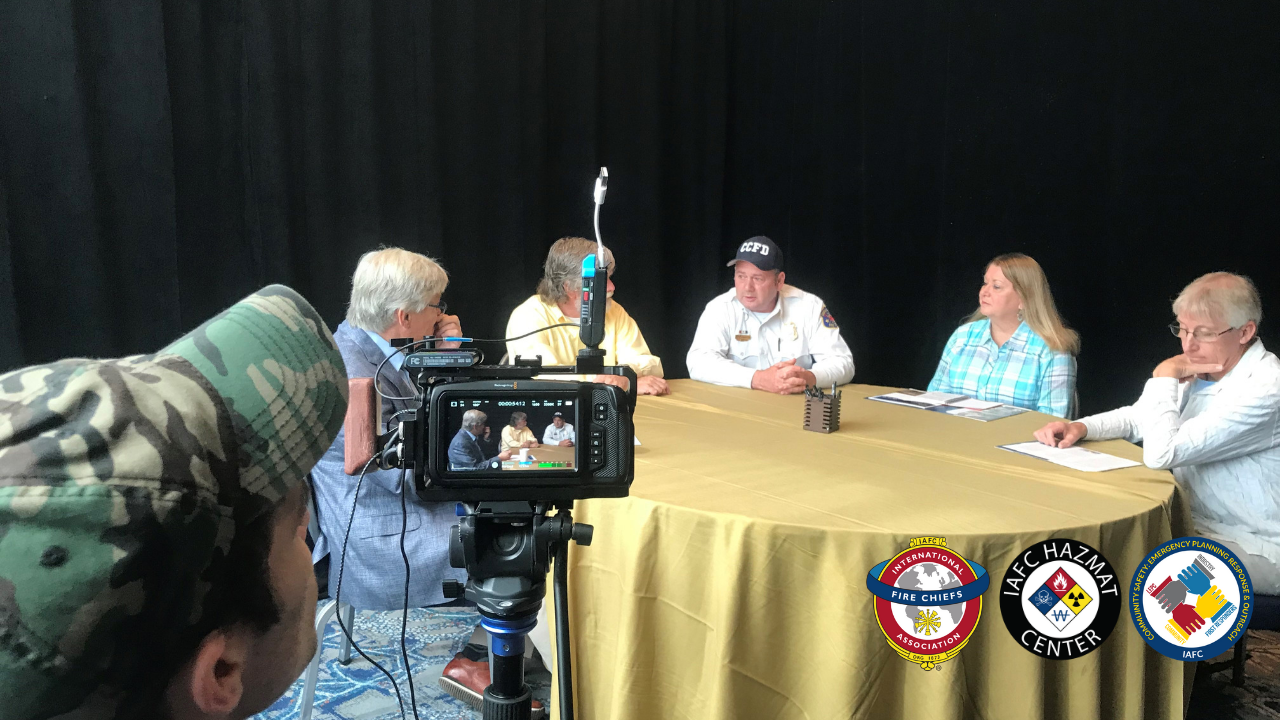
Jan 01, 0001
Preventing Occupational Exposure to Illicit Drugs
Reduce the risk of inadvertent exposure while handling or testing fentanyl or other illicit drugs by following these steps.
.png?sfvrsn=71209c0d_0)
Jan 01, 0001
Pipeline Incident Response Requires Coordination, Training and Federal Support
IAFC President Dan Eggleston today told a House of Representatives panel that an effective response to a pipeline/hazmat incident requires pipeline operators, local fire departments and other state and local officials to work together.
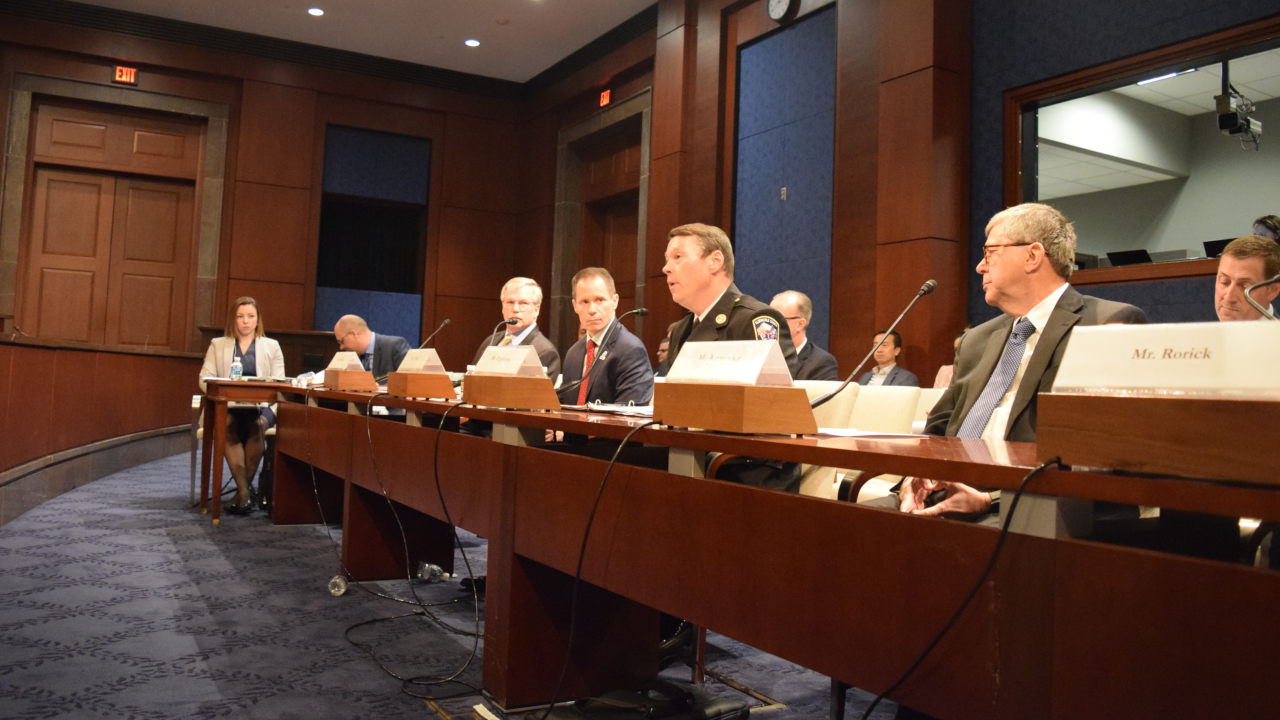
Jan 01, 0001
Community Safety Planning and Training
The IAFC Hazmat Center is proud to announce that they received the Community Safety–Emergency Planning Response and Outreach (CS–EPRO) Grant from the Pipeline and Hazardous Materials Safety Administration in November 2018.
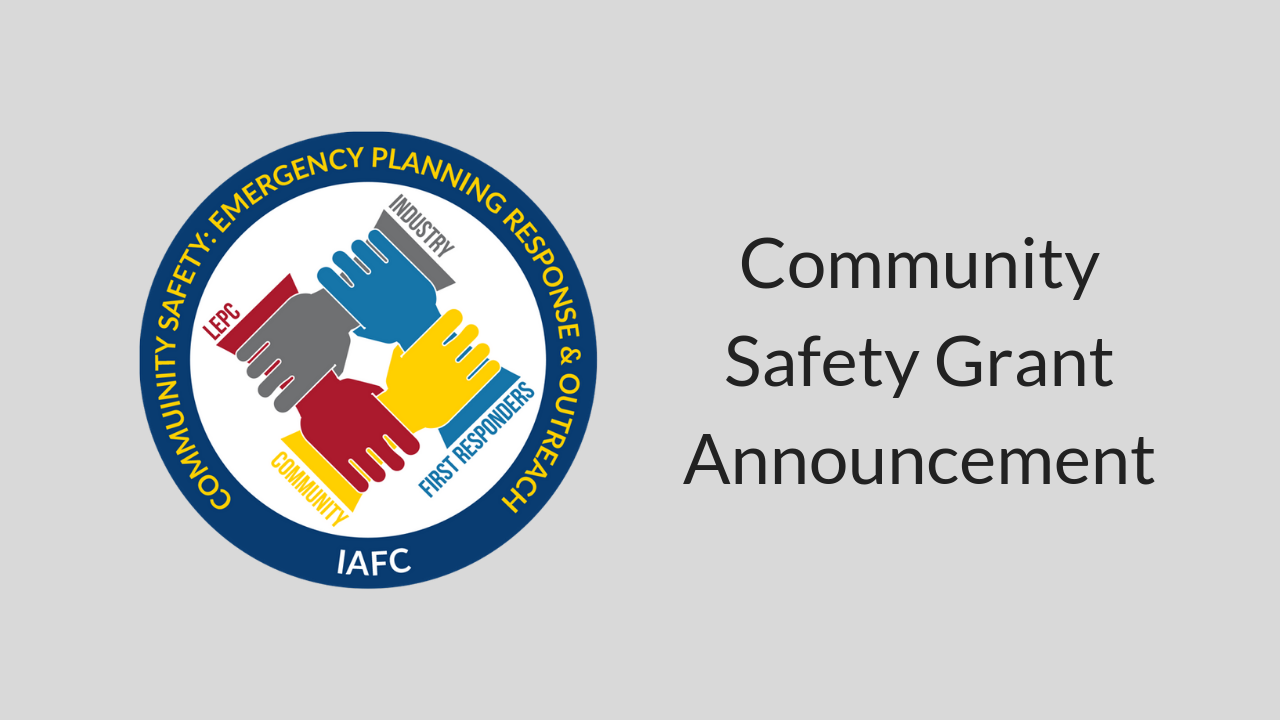
Jan 01, 0001
Rural EMS and Wildland Fire Funding Survive Final Farm Bill
Final version of the Farm Bill contains Rural EMS funding, cross-boundary fuel removal grants, and preserves current fire-safe cigarette laws.
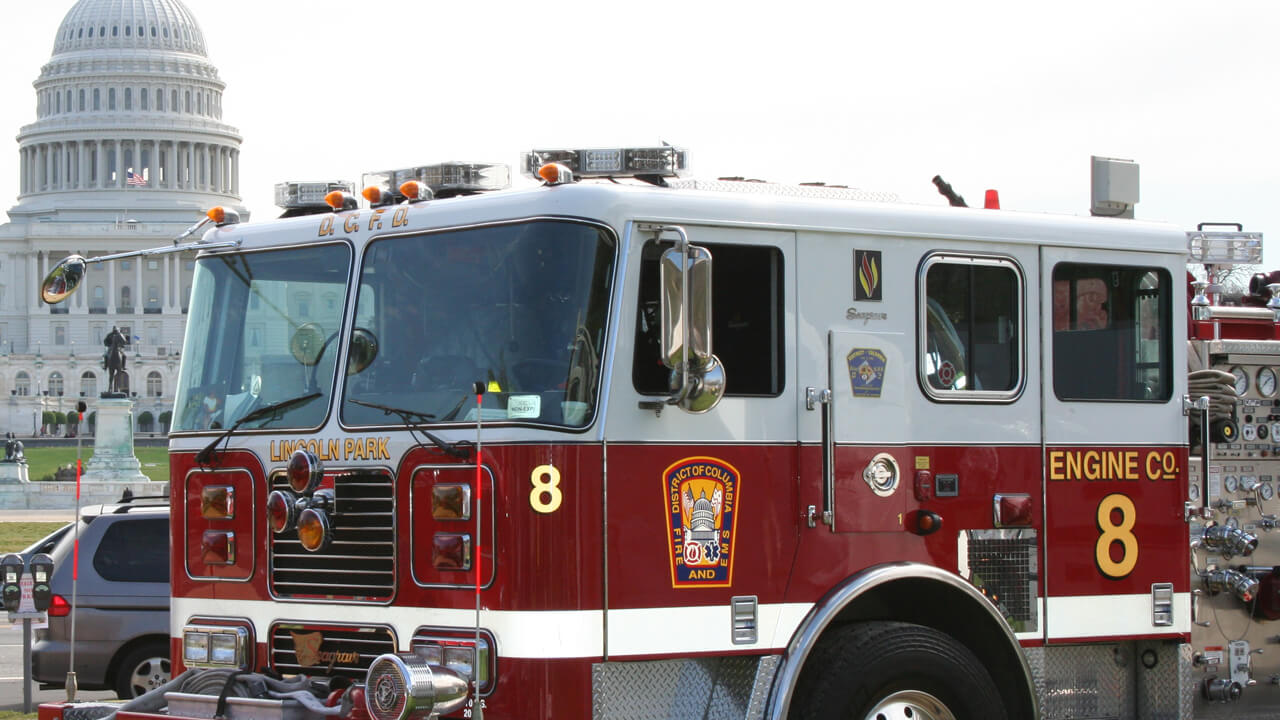
Jan 01, 0001
PHMSA Sends Out a Request for Comments for the 2020 ERG
PHMSA has requested comments and input for the 2020 ERG to improve the guidebook as it develops the 2020 edition.
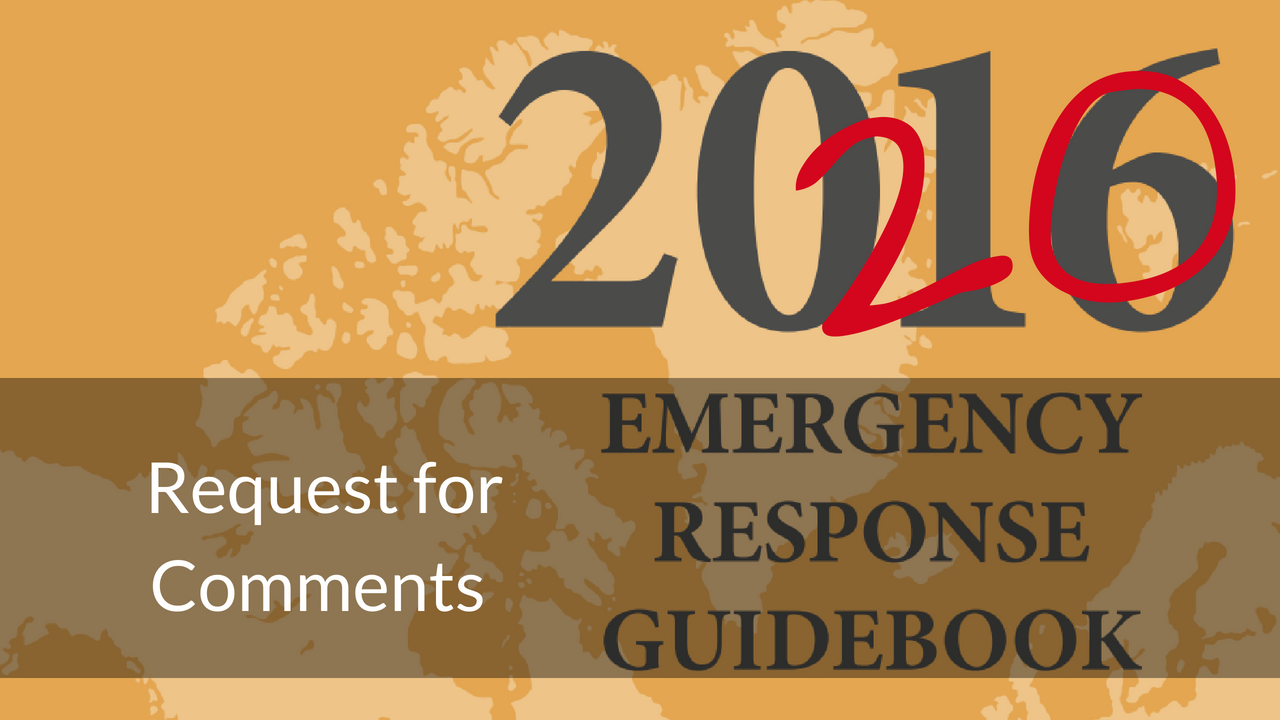
Jan 01, 0001
ALERT Grant Enables IAFC to Continue Rail Safety Program
Thousands of responders trained both online and in person.
.jpg?sfvrsn=3e49b70d_3)
Jan 01, 0001
IAFC and TransCanada Extend Partnership
Agreement Supports Pipeline Emergency Response Training across North America
